Annual report and accounts 2021-22: Performance (HTML)
Published 15 December 2022
Applies to England and Wales
Accounts presented to the House of Commons pursuant to Section 6(4) of the Government Resources and Accounts Act 2000
Annual Report presented to the House of Commons by Command of His Majesty
Ordered by the House of Commons to be printed 15 December 2022
ISBN: 978-1-5286-3722-0
HC 772
© Crown copyright 2022
Performance
Overview
This section sets out the department’s objectives as laid out in our Outcome Delivery Plan 2021-22, the challenges to the delivery of our objectives and how we have performed during the year.
Who we are and what we do
The Ministry of Justice (MoJ) is a major government department responsible for the following parts of the justice system:
- prisons
- probation
- courts and tribunals, which we administer in partnership with the independent judiciary
- a range of services to help victims of crime, children, vulnerable people, and those seeking access to justice
Read more on services delivered on pages 7 to 9.
How we operate
The MoJ is a ministerial department, supported by 34 agencies and other arm’s length bodies.
In 2021‑22 we had five executive agencies responsible for the delivery of the majority of our services to the public:
- HM Prison and Probation Service
- HM Courts & Tribunals Service
- Legal Aid Agency
- Office of the Public Guardian
- Criminal Injuries Compensation Authority
We provide services across England and Wales, and certain non‑devolved tribunals in Scotland and Northern Ireland.
Our vision and objectives
The MoJ is responsible for all aspects of justice. We are proud to work together to make a difference for the public by focusing on protecting the public; reducing reoffending; delivering swift access to justice; and reforming the constitution.
Read more about our strategic outcomes, objectives and performance on pages 20 to 51 (performance overview and performance analysis).
Executive agencies and arm’s length bodies
The MoJ and its agencies deliver prison, probation and youth custody services; administer criminal, civil and family courts and tribunals; and support victims, children, families and vulnerable adults.
Working in partnership with the independent judiciary and our arm’s length bodies, and supported by our excellent corporate functions, we deliver these services, protect the justice system and uphold the rule of law.
Agencies
HM Prison and Probation Service (HMPPS) manages 79,773 prisoners across over 100 prisons and supervises over 240,900 offenders in the community[footnote 1]. The prison service runs public sector prisons and immigration removal centres, and oversees prisons run by private providers. The youth custody service delivers public sector secure provision and oversees secure provision run by the private sector and local authorities for 10‑ to 17‑year‑olds. The Probation Service also run approved premises which support a safe transition from custody into the community and provide a high-level of monitoring and public protection.
Legal Aid Agency (LAA) works with solicitors, barristers and others to provide simple, timely and reliable access to legal aid for those whose life and liberty is at stake, where they face the loss of their home, in domestic violence cases, or where their children may be taken into care. LAA also provides a high-quality public defender service.
Criminal Injuries Compensation Authority (CICA) administers compensation schemes for victims of crime who suffer injuries and victims of overseas terrorism.
HM Courts & Tribunals Service (HMCTS) administers the criminal, civil and family courts and tribunals in England and Wales, and non devolved tribunals in Scotland and Northern Ireland. It operates more than 300 courts and hearing centres. Courts and tribunals maintain the rule of law, provide access to justice, stability, security and safety for citizens and businesses and the cohesion necessary for the functioning of our national economy and the protection of society. We operate on the basis of a partnership between the Lord Chancellor, the Lord Chief Justice and the Senior President of Tribunals, each of whom has specific leadership responsibilities enshrined in statute.
Office of the Public Guardian (OPG) protects people who may not have the mental capacity to make certain decisions for themselves. It offers services including registering lasting and enduring powers of attorney, supervising court-appointed deputies, and investigating complaints made against deputies and attorneys.
Advisory non-departmental public bodies
Advisory Committees on Justices of the Peace in England and Wales interview candidates and make recommendations to the Lord Chancellor about who to appoint to their local benches as Justices of the Peace.
Sentencing Council issues guidelines on sentencing and evaluates the impact of guidelines on sentencing practice.
Civil and family justice councils improve the justice system and the public’s understanding of it. Civil, family, tribunal and criminal procedure rule committees make necessary procedure rules to improve and simplify court procedures for the public.
Independent Advisory Panel on Deaths in Custody advises ministers on ways to reduce the number of deaths in custody.
Law Commission undertakes projects at the request of the government to ensure that the law in England and Wales is fair, modern, simple and cost-effective.
Prison Service Pay Review Body advises on pay for governors, prison officers and staff in the England and Wales prison service, and equivalent posts in Northern Ireland.
Office holders
Assessor of Compensation for Miscarriages of Justice gauges the amount of compensation to be paid to applicants under the miscarriages of justice compensation scheme.
HM Inspectorate of Prisons ensures independent inspection of places of detention, reports on conditions and treatment and promotes positive outcomes for those detained and the public.
HM Inspectorate of Probation reports on the effectiveness of work with offenders to reduce reoffending and protect the public.
Judicial Appointments and Conduct Ombudsman investigates complaints about the judicial appointments process and the judicial conduct investigation process.
Office for Legal Complaints operates the Legal Ombudsman scheme, an independent and impartial scheme set up to deal with complaints from consumers on the services they receive from regulated legal providers.
Offices of the Official Solicitor and Public Trustee help people who are vulnerable because of lack of mental capacity or young age to access services offered by the justice system.
Office of the Prisons and Probation Ombudsman for England and Wales investigates complaints from, and deaths in custody of, prisoners, children in secure training centres/homes, immigration detainees and those subject to probation supervision.
Office of the Commissioner for Victims and Witnesses promotes the interests of victims and witnesses and regularly reviews the Code of Practice for Victims of Crime.
Other
Gov Facility Services Limited provides facility maintenance services to prisons across the South of England.
Judicial Office supports the judiciary, providing advice on judicial statutory functions, legal information, communications and human resources support. It includes the Judicial College, which provides training to the judiciary, and supports the Civil Justice Council and Family Justice Council.
Independent Monitoring Boards of prisons, immigration removal centres and short‑term holding facilities monitor each facility for England and Wales on a regular basis to confirm the treatment received by those detained is fair, just and humane.
2021-22 in numbers
In this section we outline our performance during 2021‑22. Here is a snapshot of the services we provide for the public. Further information on our performance is shown in the performance analysis on pages 24 to 51.
We handled over 1.3 million criminal cases during 2021-22.
240,922 offenders supported by probation services[footnote 2].
4,338 full time equivalent band 4 probation officers in post.
The outstanding caseload in the Crown Court reduced from 59,917 to 58,653[footnote 4].
98,604 sitting days in the Crown Court, a 47% increase from 2020-21.
67% increase in convictions of rape offences between 2020 and 2021. Further 45% increase between Jan-Mar 2021 and Oct-Dec 2021.
22,002 full time equivalent prison officers in post[footnote 3].
79,773 prisoners looked after in our prisons.
75 X-ray body scanners installed across 74 establishments in the closed male prison estate. Over this time, there were 19,879 positive scans, disrupting attempts to bring harmful items into our prisons.
Delivered 109 additional places in approved premises since 2019.
Opened one new prison, HMP Five Wells in 2021-22 which is on track for full capacity by February 2023.
900 offenders subject to an alcohol tag.
Family, civil and administrative justice
Over 1.5 million civil claims handled.
95% of users were satisfied with using the online civil money claims service.
92% of users were satisfied with using the probate online service.
720,751 lasting powers of attorney registered.
Legal aid
Almost 400,000 applications for legal aid processed, with 94% of civil legal aid applications processed within 20 working days and 100% of criminal legal aid applications processed within two working days.
Over 1.2 million bills processed. 99% of complete, accurate bills were paid within 20 working days, exceeding the 90% target.
Corporate
£8 billion total comprehensive net spend during the year.
Of staff who declared their ethnicity, increase from 2020-21, in % of senior civil servants from black, Asian and minority ethnic communities from 9% to 11% and for all staff from 14% to 15%.
Reduced our total emissions by 33% compared to our 2017-18 baseline year, against a target of 41% by 2025.
Of staff who declared their disability, % of senior civil servants who are disabled remains steady at 12% and for all staff has risen from 14% to 15% from 2020-21.
Parliamentary activity
56 statutory instruments laid.
91% parliamentary questions answered within parliamentary deadline.
Forewords
By the Deputy Prime Minister, Lord Chancellor and Secretary of State for Justice
I am pleased to introduce the Ministry of Justice’s 2021-22 Annual Report and Accounts. It has been a very busy year and I am grateful to the department’s 90,000 staff for their work on the Government’s agenda, including a number of standout achievements during the reporting period.
We published our Prisons Strategy White Paper with plans to cut crime by creating a modern, secure estate with rehabilitation at its heart. We opened the first ‘smart’ prison at HMP Five Wells, which utilises the latest innovations to protect the public and rehabilitate offenders, and improved security in prisons – with enhanced gate security, including metal detecting archway portals, handheld metal detectors and drug‑sniffer dogs.
At the same time, we have continued to reduce reoffending with transitional accommodation services and Employment Hubs, as well as Prison Employment Leads to support and match prisoners to jobs on release, and announced our intention to enable prisoners to do apprenticeships.
We reunified probation, with the successful transition of the service back to the public sector, with over 7,000 members of staff transferred in from the Community Rehabilitation Companies. We also rolled out the Alcohol Abstinence Monitoring Requirement in Wales and England, imposing 3,621 alcohol monitoring requirements between April 2021 to March 2022.
In the courts, we opened two new ‘super courtrooms’ in Manchester and Loughborough, enabling more cases to be heard. We delivered the first national and local Criminal Justice System Delivery Data Dashboards, putting data at the heart of our work, ensuring transparency across the justice system.
In terms of legislation, we passed the Judicial Review and Courts Act, and the Ministry of Justice’s measures in the Police, Crime, Sentencing and Courts Act, introduced the Bill of Rights Bill into Parliament and published the draft Victims Bill.
In the year ahead, we will continue delivering on a wide range of work to meet my objectives and the Government’s manifesto commitments. This will include putting the Bill of Rights and landmark Victims Bill on the statute books, as well as implementing reform of the parole system as set out in the Root and Branch Review.
We will deliver the largest prison build programme in a century and cut crime and save lives by reducing the supply and demand for drugs as part of the cross-Government drugs strategy. Additionally, we will continue to implement the remainder of the Prisons Strategy White Paper and progress Jonathan Hall KC’s recommendations following his Independent Review of Terrorism in Prisons, including a stronger approach to Separation and a new Crime in Prison Referral Agreement.
I am determined to improve outcomes in the justice system, particularly for women and girls. Our focus as set out in the End-to-End Rape Review will continue and we remain committed to doubling the number of adult rape cases reaching court by the end of this Parliament.
When it comes to Criminal Legal Aid, we will continue the reform programme already underway. We have increased most criminal legal aid fees by 15% following an interim response to the Criminal Legal Aid Independent Review and issued our substantive response to the remainder of the consultation. The increases we are now implementing, alongside longer-term reforms, mean that criminal legal aid spending is expected to rise to í1.2 billion per year. Following our detailed consultation in March 2022 on the means test review, we will publish our response in early 2023 with proposals aimed at improving access to justice.
We will reduce the Crown Court backlog – to ensure victims get the swift justice they deserve following the unprecedent impact of the pandemic. We will also work to enable more private family law cases to be resolved through mediation without needing to go to court.
Finally, we intend to legislate to tackle Strategic Lawsuits Against Public Participation (SLAPPs) – so that those who investigate wrongdoing in the public interest cannot be silenced by the rich and powerful abusing our legal system, including supporters of Vladimir Putin and his illegal war in Ukraine.
I look forward to working with the Ministry of Justice’s staff, the Permanent Secretary, the department’s executive agencies and arm’s length bodies, the judiciary and across Government as we build on our successes over the last year and look ahead to our bold vision for a better justice system.
The Right Honourable Dominic Raab MP
Deputy Prime Minister, Lord Chancellor and Secretary of State for Justice
By the Permanent Secretary
It has been a strong year of delivery for the Ministry of Justice. I am extremely proud of the commitment of the department’s staff and partners, who have worked together with purpose to protect and enhance the principles of justice, by focusing on protecting the public; reducing reoffending; and delivering swift access to justice.
The pandemic continued to present challenges to our operations in prisons, probation, and courts. However, we have now transitioned out of the National Framework for Prison Regimes and Services for COVID-19 and into operating a local risk-based approach to manage the risk of COVID-19 in custody. As of March 2022, the number of disposals in the Crown Court has outpaced receipts.
A major milestone in our work to protect the public was placing the first prisoner in our newest prison, which is also the UK’s first ‘smart’ prison, HMP Five Wells. This is a significant achievement towards delivery of our prison building programme, delivering new and modernised prison places. We have also completed the initial construction at Glen Parva (HMP Fosse Way) and have progressed work to finalise contracts for the construction of a new prison at the HMP Full Sutton site.
We continue to improve security in prisons by funding metal detecting archway portals, handheld metal detectors and the use of drug‑sniffer dogs across high-priority sites as well as X-ray body scanners across the entire male adult closed estate. X-ray body scanners have since recorded almost 20,000 positive scans up to May 2022. We published our Prison Strategy White Paper in December 2021, which set out the government’s vision to address the most critical areas for reducing reoffending and keeping streets safe.
I have been impressed to see first-hand across the UK many of the initiatives aimed at improving the life‑chances of around 80,000 in our prisons, and more than 240,000 offenders, supporting them to reintegrate back into society. Innovation remains at the centre of this work to reduce reoffending. In the past year we have increased our use of electronic monitoring with the aim of nearly doubling the number of people tagged, and have completed the rollout of our Alcohol Abstinence Monitoring in Wales and England. Of the 3,621 alcohol monitoring requirements imposed since alcohol abstinence monitoring was introduced, individuals were compliant on over 97% of days monitored.
We successfully delivered our probation unification programme in June 2021, bringing in more than 7,000 staff from the previous National Probation Service and 21 Community Rehabilitation Companies into the unified probation service, allowing us better to supervise and support offenders in their rehabilitation.
One of our priorities has been to increase the throughput of volumes of cases by maximising capacity in the courts and tribunals system. During the year, we have opened several new courtrooms increasing available courtrooms across all jurisdictions to 2,478. We have also hosted more than 20,000 hearings using remote technology each week across all jurisdictions – an initiative that is likely to continue as an integral part of a modernised justice system.
We remain committed to putting victims at the centre of the justice system. In April 2021, the revised Victims’ Code and the Domestic Abuse Act 2021 came into force, both of which provide increased support for victims. In December 2021, we consulted on a Victims’ Bill which aims substantially to improve victims’ experiences of the criminal justice system.
This year we also published the inaugural Criminal Justice System Delivery Data Dashboard. For the first time, this brings together data from partners across the system, including the police, the Crown Prosecution Service and the courts in order to increase transparency, understanding of the justice system, and to support collaboration across the Criminal Justice System.
I am pleased that we have now completed the implementation of the department’s new operating model, which aims to strengthen our delivery capability, accelerate digital transformation of our services, and puts data and evidence at the centre of our decision-making. Over the coming year, our focus will remain on attracting and retaining top talent across all disciplines for us to continue to deliver our priorities.
Thank you to the Rt Hon Robert Buckland KC MP and the Rt Hon Dominic Raab MP for their leadership as Lord Chancellors and Secretaries of State for Justice during the reporting period. Working together, we made significant progress against all aspects of our strategic outcomes. This progress has been made possible by the huge amount of work delivered by MoJ’s team of 90,000 people across the UK. It is a privilege to lead them.
As we prepare our Annual Report and Accounts this year, many across the UK, Commonwealth, and the whole world are mourning the death of Her Majesty Queen Elizabeth II. The Queen was the embodiment of public service and duty. On behalf of the whole department, we are proud to have served Her Majesty’s Government and will continue to provide the highest levels of commitment and professionalism to His Majesty’s Government.
Antonia Romeo
Permanent Secretary and Principal Accounting Officer
By the Lead Non‑Executive Board Member
2021-22 has been another challenging year for the Ministry of Justice, mirroring events in the wider environment where COVID-19 remained a major factor. I would like to take this opportunity to express my heartfelt condolences to families of staff and service users who have, like me, lost someone to COVID-19. We are still battling some of its impacts but there are now new challenges to overcome such as the rising cost of living. These wider influences affect the Ministry of Justice and how it can deliver its services. For example, inflationary pressures on building materials are having a knock-on impact to the overall costs of delivering new prisons. Given that these newer issues are still in their early days, I am sure the next year will be another difficult one for everyone to manoeuvre.
Last year I talked about the increasing backlogs of cases in our courts, particularly the Crown Court. This trend continued for part of 2021-22 but, with the easing of COVID-19 restrictions, the department has implemented activities to begin to reverse this. Unfortunately, the necessary pace of reversal is not easy to achieve, and the department is only too aware of the impact this is having on many people, including victims, witnesses and those being held on remand. The department is taking a multi-pronged attack to the backlog, retaining some Nightingale courts, and working more closely with the police, CPS and judiciary to increase the volume and speed of cases going through the system. They have taken forward initiatives such as increasing the thresholds of magistrates so that they can issue prison sentences of up to one year rather than move cases to the Crown Court. Another crucial element has been to increase the number of sitting days for judges but this, along with other measures, needs financial resource. It was encouraging, therefore, to see the three year Spending Review settlement received from HM Treasury in October 2021. This will help increase capacity across courts, prisons and probation and will also bolster support for victims of crimes.
Another way the department could accelerate their court recovery plans is through the delivery of Court Reform. In my role as the Chair of the Court Reform Challenge Panel, I have helped provide the independent challenge, support and additional assurance needed on the rigour of decision‑making and overall health of the programme. The programme is already producing some good results, despite implementation being more challenging because of COVID-19. However, it is very reliant on third parties fully to deliver its benefits – for example, the joint work to integrate Common Platform with the CPS’s case management system – so further work is required before this is fully operational and yielding the expected benefits.
A great success for the department during the year has been the unification of the National Probation Service. Transferring over 7,000 staff from community rehabilitation companies into the National Probation Service was challenging but it was achieved relatively smoothly. More importantly this will ensure that the Probation Service will provide a better and more consistent supervision of offenders, helped by the doubling of the recruitment of probation officers over the year. My fellow non-executive Nick Campsie has been instrumental in providing support, challenge, and advice through the Probation Challenge Panel to help achieve this smooth transition. As I write this, although continuing on the panel, Nick has stepped down from the Departmental Board. He has been a committed non-executive with an innate ability to challenge standard ways of thinking. His contributions will be sorely missed.
Audit and Risk Assurance Committees provide an important role to Departmental Boards by assuring that there are effective arrangements in place for governance, risk management and internal control. Paul Smith, our non-executive chair of ARAC, has continued to strengthen this assurance, working even more closely with Agency and ALB ARAC Chairs. Although all the non-executive team have provided advice and challenge on the Outcome Delivery Plan, Paul has taken the lead on this along with wider issues such as championing the union agenda in the department and more recently our sustainability agenda by challenging the department on its approach to managing climate change risks.
We also say goodbye to Shirley Cooper who provided excellent commercial insight and challenge to the commercial function including supporting director recruitment but has also offered independent challenge via the Prison Reform Board. Her unfailing good humour, and willingness to take things on, made her a valued member of the non-executive team.
I am fully supportive of the new target operating model implemented within the MoJ to help modernise the department. This will help put data at the heart of the MoJ’s decision‑making and strengthen delivery capability on major programmes. Paul Smith and I have had the opportunity, through the Delivery Board established last April, to gain oversight and scrutiny of the plans for some of the departments’ major projects. Accordingly, we welcome this change. Ministerial and executive membership changes to the Departmental Board have been significant this year. In September 2021, Robert Buckland QC was succeeded as Secretary of State by Deputy Prime Minister Dominic Raab. During the 12-month period covered by this report our Board met twice. There is now an increased focus on Key Performance Indicators for the department. We also undertook several in‑depth reviews and discussions concerning prison recovery, probation reform implementation, savings and efficiency, workforce planning and courts and tribunals recovery. With the agreement of the Secretary of State it has been decided to postpone the Board Effectiveness Review in 2021-22. Back in March 2021, we conducted a very rigorous external review, since when there has been significant change in board membership and only two board meetings. Therefore, it is premature to have another review at this stage, and it has been deferred until late 2022.
Since this reporting year end, there have been further changes to the Departmental Board’s membership. In July 2022, we welcomed a new non-executive member, Mark Beaton to the Departmental Board. Mark brings with him a wealth of experience and knowledge. On behalf of the non-executives, we look forward to working with the Secretary of State to deliver the department’s priorities in what will be a challenging economic environment.
Mark Rawlinson
Non-Executive Board Member
Chief Operating Officer’s review of the year
As this annual report demonstrates, the department delivered significant value for taxpayers and users of the justice system across the year. This progress, built on the commitment, ingenuity and professionalism of our colleagues, has been enabled by strong financial management.
Building on lessons learnt from the volatility experienced in the previous financial year, we have maintained a strong grip on our finances. Our capital outturn, £1,421 million, represents a record level of investment in our infrastructure. We have spent our resource DEL (RDEL) wisely, supporting the recovery of vital public services and effectively managing risk.
The department’s resource budget, as voted by Parliament in the Supplementary Estimate, was £9,410 million, capital DEL (CDEL) was £1,546 million, total resource AME was £660 million and total capital AME was £42 million. Figure 1 shows performance against our 2021-22 control totals.
Figure 1: Performance against parliamentary control totals
| Supplementary Estimate £m |
Outturn £m | Variance £m | |
|---|---|---|---|
| Resource DEL | 9,410 | 9,376 | 33 |
| Of which | - | - | - |
| Administration | 495 | 444 | 51 |
| Capital DEL | 1,546 | 1,421 | 125 |
| Resource AME* | 660 | 350 | 310 |
| Capital AME* | 42 | 10 | 32 |
| Net cash | 10,630 | 10,125 | 505 |
*AME spending is inherently volatile and dependent on a number of factors outside the control of the department, resulting in the variance between outturn and estimate.
Resource expenditure
The department spent £9,376 million to manage the recovery from the pandemic and deliver the results set out in our performance report. Figure 2 shows where we spent our money. The largest area of spend is on our people. Staff costs account for almost 42% of the department’s gross expenditure, with the biggest employer being HMPPS. In 2021-22, staff numbers and costs increased as over 7,000 staff joined from Community Rehabilitation Companies as part of our ambitious reforms of probation.
Figure 2: Departmental expenditure
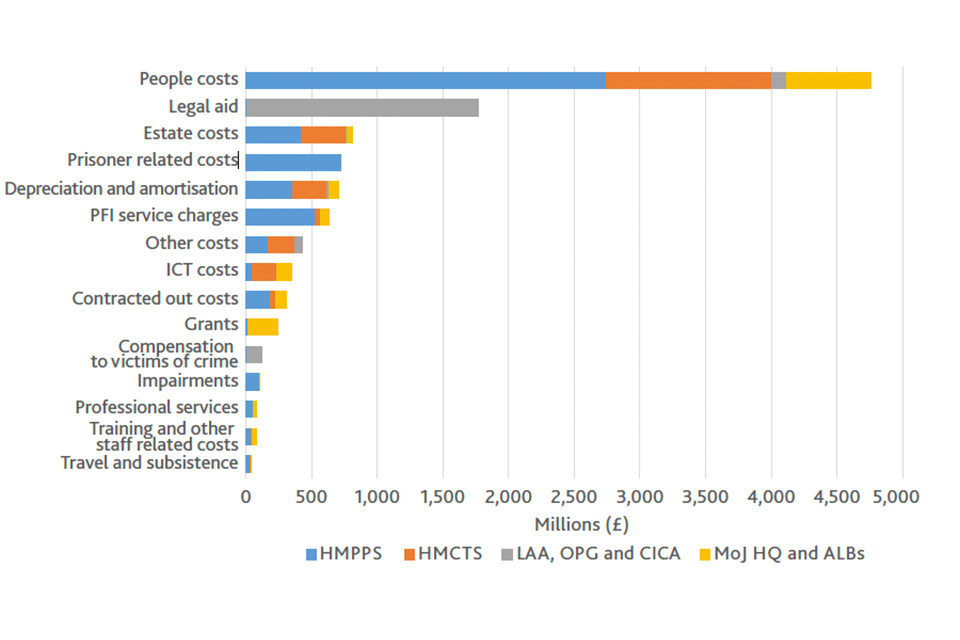
Capital investment
Between 2020-21 and 2021-22 our capital budget increased from £1,077 million to £1,546 million. This was targeted at our existing critical infrastructure and to support the building of new prison capacity. In 2021-22, we spent £1,421 million of our budget. Parts of our capital budget were underspent due to supply chain challenges. The implementation of IFRS16 also contributed as the total cost of new leases has proved to be difficult to predict.
In November 2021 , the government confirmed its multi-year funding commitment to our major prison build programme, announcing a í3.8 billion investment over the three-year Spending Review period to deliver 20,000 additional, modern prison places by the mid-2020s. Over 2,800 of these additional places had been delivered by the end of March 2022, including places at the newly opened HMP Five Wells. HMP Five Wells received its first prisoner in February 2022. Construction of a new prison at Glen Parva, HMP Fosse Way, is underway and expected to be completed in mid- 2023. In November 2021, planning permission was granted for a 1,468 place Category C resettlement prison at Full Sutton. Pre-construction works at Full Sutton have begun and the prison is expected to be ready in early 2025.
We received £315 million to improve levels of decency and compliance across our existing prison estate, and to slow the rate at which places are lost as a result of dilapidation. This allowed us to update critical infrastructure, such as fire systems and boilers, refurbish cells and improve conditions for those living and working in prisons requiring the most urgent attention.
In HMCTS, we spent £108.5 million on critical maintenance works and estate projects to enhance the resilience of our courts and tribunals estate and maintain operational capacity.
We continued to invest in the court recovery programme and on a package of reforms to modernise the procedures and infrastructure of courts and tribunals and make court processes more efficient.
We invested in cyber security and modernising technology across our estate.
Spend on COVID-19 related activities
In 2021-22, the department received £246 million (2020-21: £466.1 million) additional funding from HM Treasury to support operational delivery in response to the COVID-19 pandemic, of which £237 million was spent on COVID-19 related activities[footnote 5]. The underspend was due to the department delivering its response in an unpredictable and rapidly changing environment, managing demand and changes in the system, while keeping staff and those who use our services safe as we worked to recover from the pandemic.
£77.5 million was invested to support the recovery of our courts and tribunals funding additional staffing, safety and cleaning measures as well as Nightingale court running costs, external juror deliberation spaces, and development of remote hearings. £22.5 million, funded out of our own budget, was spent on the extension of new leases for Nightingale courts through to March 2022.
£40.6 million was to support HMPPS to ensure safety and decency in prisons and probation by introducing steps to contain the spread of COVID-19 in prisons with additional accommodation spaces and PPE. This funding was spent on the provision of extra accommodation in prisons; wider steps to contain the spread of COVID-19; staff overtime payments; PPE purchases; and costs associated with the introduction of exceptional models of delivery, including those to support prisoner welfare.
£71 million was to cover the increased legal aid costs within the Family and Crown Court due to the increased number of sitting days which meant we were able to provide simple, timely and reliable access to legal aid.
A further £25.4 million was spent on grants for victims support, IT infrastructure and enhanced cleaning.
EU Exit
In 2021-22, the department received £20 million additional funding and spent £16.3 million on direct EU-Exit related activities. The underspend was due to a lower than expected number of court cases flowing through the system as a consequence of leaving the EU, and consequently a drop in legal aid support costs and lower than expected judicial costs.
At the end of the year there were 65 full time equivalent staff working on EU Exit across the department.
Figure 3: Analysis of EU Exit expenditure by activity:
| Activity | 2021-22 | 2020-21 |
|---|---|---|
| £m | £m | |
| Courts impacts, including judicial recruitment and training | 11.8 | 16.6 |
| Negotiations | 2.6 | 4.5 |
| Commercial contracts and supply chain management | 0.2 | 1.4 |
| Prisons operational contingency measures | - | 1.2 |
| Legal advice | - | 1 |
| Affiliated functional support | 0.3 | 0.9 |
| Internal/external communication | 0.6 | 0.6 |
| Legal aid support | 0.8 | 0.6 |
| Total EU spend[footnote 5] | 16.3 | 26.6 |
| Set up of IMA[footnote 6] | - | 5.5 |
Income
The department’s costs are partly funded by income from a number of sources including fees, fines, recoveries from other government departments, contributions from clients who received legal aid funding and income from prison industries.
Figure 4: Analysis of 2021-22 revenue sources:
| £m | |
|---|---|
| Fees income | 744 |
| Fines receipts | 408 |
| Recoveries from other government departments | 127 |
| Income from sale of goods and services | 82 |
| Income from NHS and other health bodies | 54 |
| Other income | 43 |
| European Social Fund | 42 |
| Victims surcharge | 38 |
| LAA recoveries | 34 |
| Remand income | 32 |
| Rental income | 32 |
Total income in 2021-22 was £1,636 million compared to £1,346 million in 2020-21, an increase of 22%. As a proportion of our gross resource budget, income made up 15% in 2021-22 compared to 14% in 2020-21.
Income levels are mainly dependent on activity in the courts – processing cases and enforcement activity. In the previous year, both this and activity at the Office of the Public Guardian (lasting powers of attorney fees) were heavily impacted by COVID-19. In 2021-22, income recovery has started to trend towards prepandemic levels.
The figure below shows the sources of income across the department.
Figure 5: Revenue sources and movements since last year
| 2020-21 | 2021-22 | |
|---|---|---|
| Total | 1,346 | 1,636 |
| Increase | Decrease | |
|---|---|---|
| Fees income | 121 | |
| Fines | 117 | |
| Recoveries from OGDs | 26 | |
| LAA recoveries | 8 | |
| Other | 32 | |
| Rental | 14 |
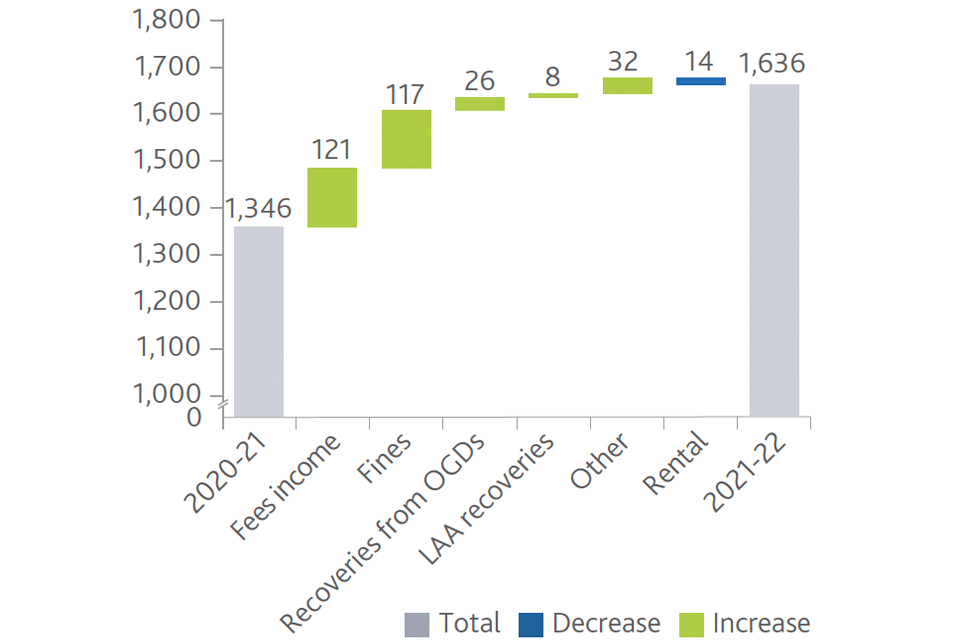
Future plans
MoJ agreed new multi-year budgets through the 2021 spending review (SR21). By 2024-25, the department will receive £10.1 billion of resource funding, an increase of around £1.4 billion on our 2021-2022 budget. This funding will support the department to increase capacity in our core services, to invest in services to reduce reoffending and to support more victims of crime. We have also secured £5.3 billion of capital funding over the next three years to invest in our core infrastructure and to continue the expansion of our prison estate.
We are keeping our plans under review as we move forward and in the face of increasing economic pressures. In this context, allocating resources to where they will be most efficiently used will be fundamental to us delivering the government’s priorities for justice.
James McEwen
Chief Operating Officer
Our performance
In July 2021, we published our Outcome Delivery Plan 2021-22. This set out our updated priority outcomes, our strategy for achieving them and the metrics that we would use to track performance.
Our Outcome Delivery Plan lays out our commitment to:
- protect the public from serious offenders and improve the safety and security of our prisons
- reduce reoffending
- deliver swift access to justice
Alongside the delivery of our three strategic outcomes, we committed to progress the government’s programme to restore the justice system through the delivery of commitments to progress constitutional reform, ensuring we have a human rights framework that has the confidence of the public, while also protecting and upholding the rights of individuals.
We measure our performance using a range of indicators and data captured throughout the year, enabling us to understand the broader impact that the department is having, with the aim of delivering improvement. All our performance information is published on GOV.UK.
Performance overview
This performance overview provides a high‑level summary of how we progressed delivery of the priority outcomes set out in our 2021‑22 Outcome Delivery Plan. The performance analysis section of this report on pages 24 to 51 provides further details of our activities, and an analysis of progress against key performance indicators and the principal risks we have faced.
Protect the public from serious offenders and improve the safety and security of our prisons
The COVID-19 pandemic continued to impact the delivery of prison, probation and youth custody services. We prioritised public protection in the criminal justice system by:
-
implementing sentencing reforms, including introducing tougher sentences for the most serious offences, such as those convicted of the premediated murder of a child and terrorist offenders
-
creating capacity in our prisons by modernisation of our existing estate and continuing with our ambitious prison building programme, which included the opening of our newest prison HMP Five Wells
We worked to keep our prison estate safe and secure by:
- installing equipment to prevent contraband, harmful goods that we know contribute to assaults and disorder within prisons, from entering the estate
- improving our Assessment Care in Custody and Teamwork case management model to help address risks and triggers of prisoners at risk of self-harm
Reduce reoffending
Reducing reoffending is central to the government’s commitment to cut crime. We have tested and introduced a range of initiatives to tackle the main drivers of reoffending: unemployment, homelessness and substance misuse by:
- introducing prison employment leads and employment hubs in prisons to help prisoners find jobs on release
- launching a transitional accommodation service to provide temporary accommodation to prisoners who would otherwise be homeless on release
- piloting drug-recovery wings in prisons to support prisoners to live drug-free lives
- delivering the unification of our probation service, allowing us to better supervise and support offenders in their rehabilitation, a significant milestone in our Probation Reform Programme
Deliver swift access to justice
COVID-19 posed considerable challenges to our courts and tribunals and our focus has been on recovering our services and strengthening the resilience of our courts.
We responded by:
- increasing the capacity of our courts and judiciary by opening new courtrooms, recruiting more judges and increasing sitting days in order to be able to hear more cases
- progressing our ambitious reform programme, helping to ensure our courts can be smarter and more efficient, by commencing the rollout of the Common Platform and widening the usage of audio and video technologies to ensure justice services are quicker and easier to achieve
- introducing a range of measures to support victims and witnesses in their interactions with the justice system, by improving funding for victims’ services, introducing the revised Victims’ Code and enacting the Domestic Abuse Act
Constitutional reform
The government’s commitment to reform human rights and administrative law was also a priority in the year. We responded by:
- developing a Bill of Rights to replace the Human Rights Act 1998, to create a new balance between individual rights, judicial interpretation, and the role of Parliament
- including measures in the Judicial Review and Courts Act 2022 which make judicial review more efficient, by removing an avenue of review that had a very low success rate, and more effective, by giving judges greater freedom to tailor remedies to the specific circumstances of a case
Strategic enablers
Our corporate functions have continued to support delivery of our outcomes by:
- running ambitious recruitment campaigns within our courts, prisons and probation service to ensure we have the personnel to run our services effectively
- expanding our digital services in courts and prisons. We have also launched new services to improve user experiences, including a new service for applications to the Criminal Injury Compensation Authority and commencing work to improve the process of applying for lasting powers of attorney, bringing us closer to being a fully digital service
- working with national employers to support the recruitment of offenders through offender employment summits and leading trade missions overseas to promote the growth of the UK legal services sector around the world
- continuing to embed environmental sustainability in all we do, including through the development of sustainability action plans and nature recovery plans
Principal risk summary
| Principal risk area | Outcome /enabler | Trend this year | Comment on trend | Reference to performance analysis |
|---|---|---|---|---|
| Operational delivery: reducing the levels of outstanding cases in the criminal and family courts, and ensuring there is always sufficient prison capacity to fulfil the sentences of the courts. | 1, 2,3 | stable | Operational delivery risks have remained largely static throughout 2021 despite additional waves of COVID‑19. From September 2021 to April 2022, the number of cases completed in the Crown Court was greater than the number of cases received. We have provided additional prison places in 2021‑22 but expect the prison population to rise significantly in the 2020s | Page 24, 28, 29, 33 |
| People and capability: ensuring the wellbeing of our people, leading the way in developing innovative future ways of working, developing the right capacity and capability to deal with future challenges. | 1, 2,3, 4, 5, 6 | increasing | Wellbeing risks related to COVID 19 improved throughout the year as the impact of the pandemic eased. Other people risks have consistently risen and we are now seeing significant recruitment and retention issues across the MoJ in executive agencies, functions and our policy areas as a result of changes in the labour market. | Page 24, 30, 33, 38 |
| Technical debt and cyber security: reducing technical debt and reducing the likelihood of a cyber security attack, keeping our information secure and enabling compliance with GDPR and other legislation | 1, 2,3, 5 | stable | A revised Digital and Technology Strategy was put in place in 2021-22 and additional investment made to reduce our exposure to business critical system failure and cyber-attack. The scale of our technical debt remains significant and we are now seeing a heightened risk of cyber threat due to the Russian invasion of Ukraine. | Page 24, 29, 34, 38 |
| Commercial: dealing with our commercial challenges, including the strength and confidence of markets and supplier financial sustainability | 1,6 | stable | As the impacts of COVID-19 eased, our commercial risks fell slightly in August 2021 and have since remained static. We are now dealing with a significant level of volatility in supply chains as a result of ongoing global uncertainties. This includes inflationary pressures, availability of materials and the resilience of a range of suppliers, particularly covering construction and facilities management and energy markets. | Page 19 |
| Change: we have an ambitious portfolio of change projects with a range of risks that require active and ongoing management to ensure delivery | 1,2,3, 5,6,7 |
stable | We have continued to manage the risks in our change portfolio throughout the year. These are now being impacted by our ability to gain planning permission for new prison builds and commercial risks across the project lifecycle, including risks around market strength and capacity and supplier performance (see commercial). | Page 24, 29, 34 |
| Evidence and insight: Ensuring that decisions taken by ministers and others are underpinned by sufficiently accurate evidence | 2,3, 5,6 |
new | The MoJ’s new target operating model introduced in 2021-22 places much greater emphasis on the importance of departmental collaboration and innovation on Data, Digital and Delivery. A new principal risk was introduced in August 2021 which recognised the importance of exploring the risks to delivery of this and ensuring effective management actions are in place to support decision‑making | Page 31, 35, 37, 39 |
| Property: Failure to maintain an estate that is compliant, operational, environmentally sensitive, and efficient | 1,3, 6,7 |
stable | Work has taken place through 2021-22 to build a comprehensive view of the condition of the estate, encompassing both buildings and land together with assets within properties. We have invested in the maintenance of our buildings to increase capacity and reduce dilapidation, while also undertaking planned maintenance programmes. We continue to ensure our buildings remain safe places to work and deliver services from. | Page 33, 39 |
Key to outcomes and strategic enablers
Outcomes:
1 Protect the public from serious offenders
and improve the safety and security of
our prisons
2 Reduce reoffending
3 Deliver swift access to justice
Strategic enablers:
4 Workforce, skills and location
5 Innovation, technology and data
6 Delivery, evaluation and collaboration
7 Sustainability
Our performance analysis
Priority outcome 1: Protect the public from serious offenders and improve the safety and security of our prisons
Priority for 2021-22: Deliver sentencing reform, more prison places, safer prisons and strong action on extremism.
We expect the prison population to rise during the 2020s because of the planned recruitment by the Home Office of an additional 20,000 police officers. To meet an increase in demand, we are continuing with our ambitious prison build programme creating additional, secure accommodation with a focus on the rehabilitation of offenders. In November 2021, the government announced a í3.8 billion investment over the following three years to deliver 20,000 additional, modern prison places by the mid-2020s, the biggest prison building programme in more than a century.
By the end of March 2022, over 2,800 of these additional places had been provided. This was achieved through a combination of refurbishments, repurposing existing sites, temporary accommodation and the opening of the first of our new prisons. HMP Five Wells received its first prisoner in February 2022 and is the most technologically advanced prison in our estate.8 The prison has a strong focus on rehabilitation, providing education and on-the-job training with local employers to boost prospects after release. Construction of a new prison at Glen Parva, is expected to be completed by mid-2023.
We have undertaken an extensive programme of Prison Officer recruitment and significant work is ongoing to improve retention rates. Our Prison Safety Programme is structured around three pillars: prevention, intervention and education. We have continued to implement the Offender Management in Custody (OMiC) model which puts rehabilitation at the centre of custodial and post-release work. OMiC provides each prisoner with a prison officer key worker. There has been a gradual increase of key work delivery in the male closed estate as prisons have started to move out of restricted regimes. One‑to‑one keyworker support builds a relationship between each prisoner and a prison officer keyworker that engages, challenges and supports the prisoner, reducing frustration and promoting rehabilitation and safety.
To help address self-harm rates we have implemented a revised case management approach across the prison estate, known as Assessment, Care in Custody and Teamwork (ACCT). Revisions in ACCT (version 6) include:
- a stronger emphasis on taking a person‑centred approach
- better multi disciplinary team working
- a consistent quality assurance process
- an improved focus on identifying and addressing an individual’s risks, triggers and protective factors
The Next Generation Safety Programme includes measures set out in the Prison Strategy White Paper to enhance existing efforts to reduce self‑inflicted deaths and self-harm. This includes introducing a peer support model in selected prisons, which will train prisoners to support others, and establishing an expert innovations taskforce, to pilot new initiatives to tackle self-harm.
The Counter Terrorism and Sentencing Act was brought into law in April 2021[footnote 9]. This law introduces tougher sentences for terrorist offenders and ends automatic early release for those convicted of serious terror offences[footnote 10].
We are delivering the Counter Terrorism Step‑Up Programme, improving our capacity and capability to monitor terrorist offenders. We have supported Jonathan Hall’s enquiry into terrorism in prisons, accepted the vast majority of his findings and are implementing them. We have established a new national security division to manage offenders in the community. We have also created a multi-agency Joint Counter Terrorism Prisons and Probation Hub, working with Counter Terrorism Police and MI5 to strengthen our working partnerships and improve intelligence capabilities[footnote 11]. We’ve completed our £100 million Security Investment Programme as part of improving security and reducing crime in prisons[footnote 12]. We’ve introduced metal detecting archway portals, handheld metal detectors and the introduction of 154 drug-sniffer dogs. Between July 2020 and March 2022, we installed 75 X-ray body scanners across 74 establishments in the closed male prison estate. Over this time and up to April 2022, these had 19,879 positive scans, disrupting attempts to bring harmful items into our prisons[footnote 13].
In March 2022, we announced a package of landmark reforms designed to restore public confidence in the parole system. These proposed reforms will make public protection the overriding factor in parole decisions by making that clear in the release test the Parole Board must apply, introduce ministerial oversight of release decisions for the most serious offenders and improve victim participation in the process to make sure their voices are heard[footnote 14].
On 28 April 2022, the Police, Crime, Sentencing and Courts Act came into force[footnote 15]. This introduces tougher sentencing for the worst offenders and ends the automatic halfway release from prison for those convicted of certain serious sexual and violent offences.
We reduced the risk of COVID-19 entering and spreading in prisons by implementing an extensive asymptomatic testing programme and, with NHS colleagues, an effective vaccination programme roll out. The National Framework for Prison Regimes and Services sets out how we have made decisions to balance the risks from COVID-19 with the impact on prisoners’ mental health and rehabilitation[footnote 16]. Both programmes have significantly reduced hospitalisations and saved lives. With the emergence of the more transmissible Omicron variant in December 2021, we reintroduced tighter regime controls and reduced prisoner mixing and movement to help keep our colleagues and prisoners safe. Following the government’s ‘Living with COVID’ strategy and the lifting of national restrictions in February 2022, we eased COVID-19 controls and offered all prisoners face-to-face visits by the end of March 2022. Following the exit from the National Regime Framework, we now rely on a core set of measures that seek to retain our infection resilience while minimising disruption to the delivery of regimes. This will continue to be supported by swift and proportionate local intervention where public health incidents occur, where outbreaks are found, or to respond to significantly escalating risk.
Our performance metrics
Useable prison places
- Prisons capacity – useable prison places
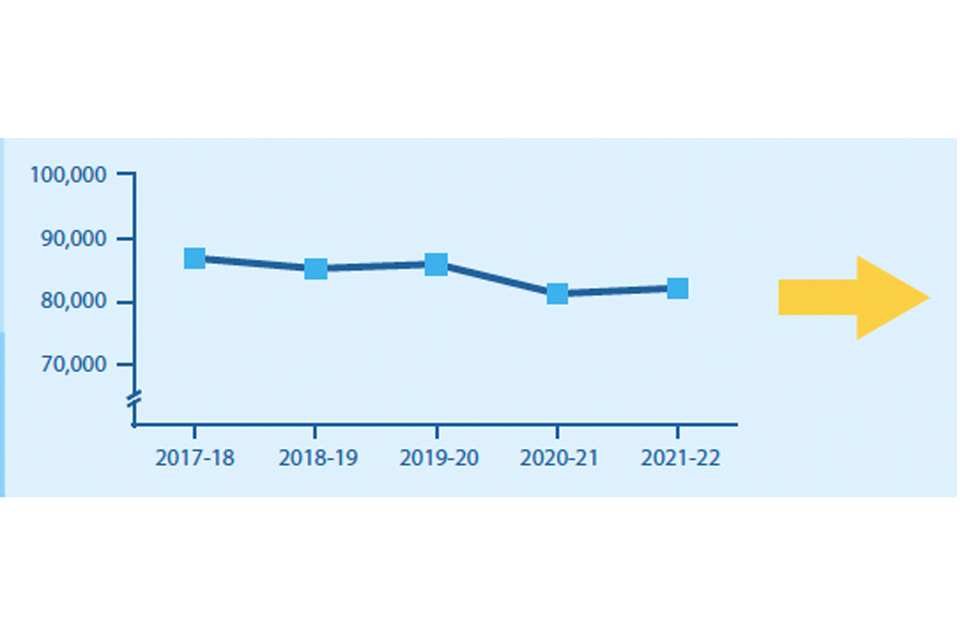
Prisoner-on prisoner assault[footnote 17]
- Rate of incidents per 1,000 prisoners
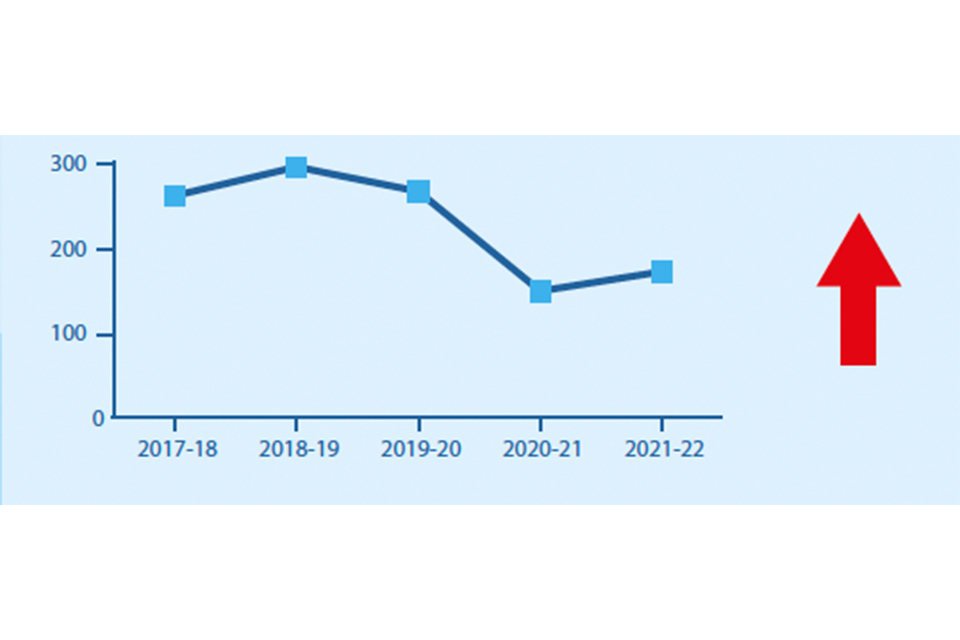
Prisoner on staff assaults[footnote 17]
- Rate of incidents per 1,000 prisoners
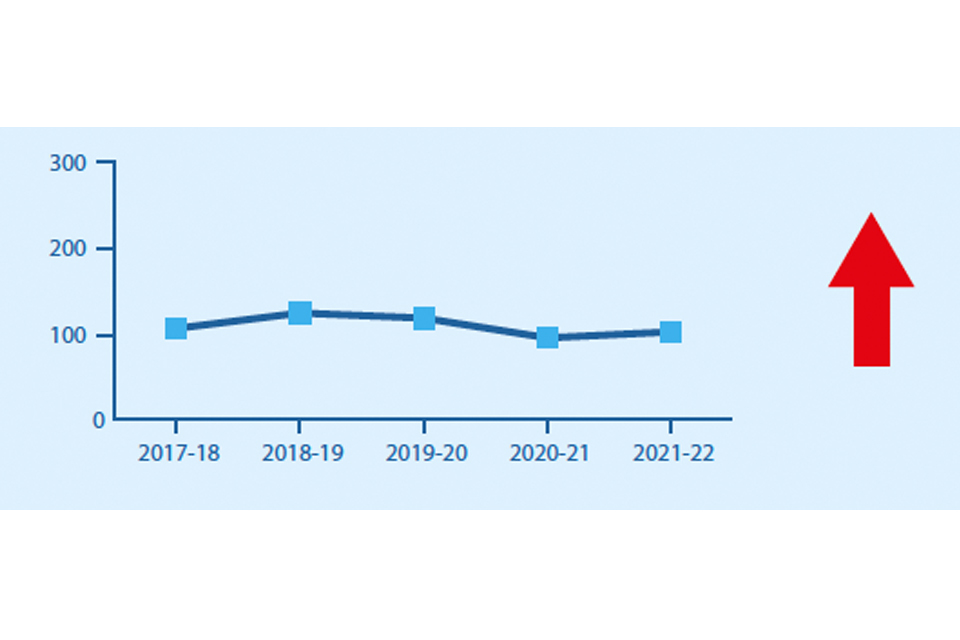
The rate of prisoner-on-prisoner assault and the rate of assaults on staff decreased during COVID-19 influenced by reduced contact due to the introduction of regimes to reduce the spread of COVID-19. As prison regimes have reopened , assault rates have started to rise due to the increased opportunity, although they remain below prepandemic levels.
Self-harm incidents[footnote 17]
- Monthly rate of incidents per 1,000 prisoners
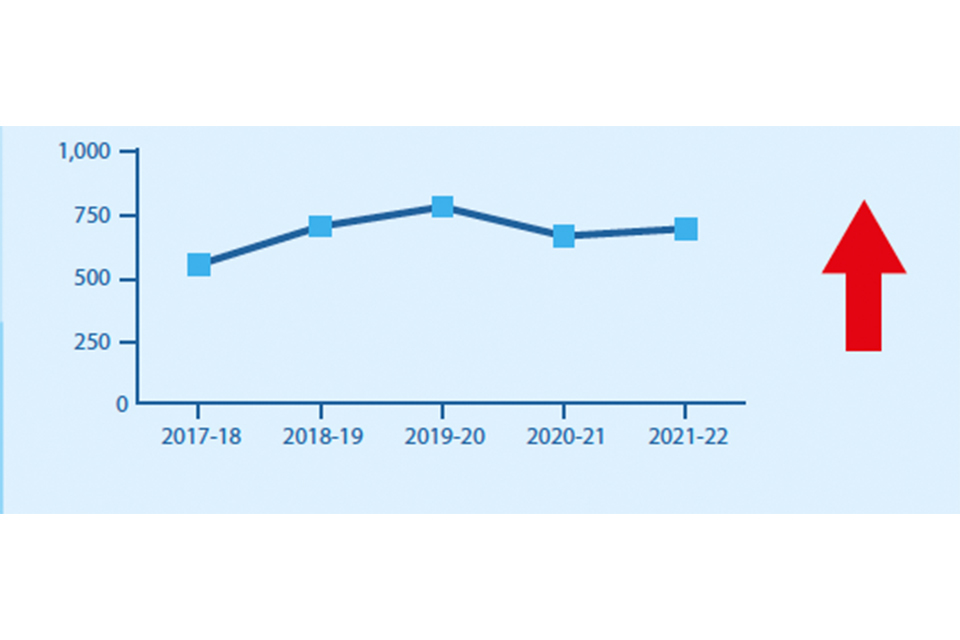
The rate of self-harm incidents per 1,000 prisoners has increased by 4% overall. In April 2021, we established a multidisciplinary women’s self-harm taskforce to gather and evaluate evidence and implement measures to support women at risk. This included introducing a specific COVID-19 workstream to immediately improve our ability to address the drivers of self-harm in the pandemic conditions.
Random mandatory drug tests
- % of random mandatory drug tests for illicit substances with positive results
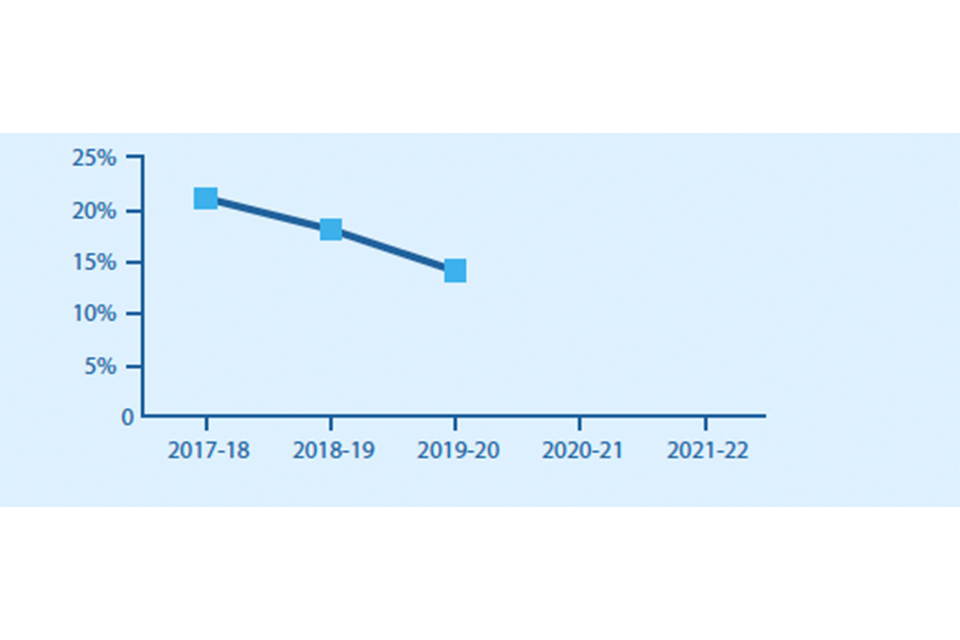
Following the pause in random mandatory drug tests as a result of COVID-19, testing has resumed but is not yet at levels that will enable robust estimation or trend analysis.
Serious further offences
- % of those in the overall probation caseload that result in a serious offence conviction
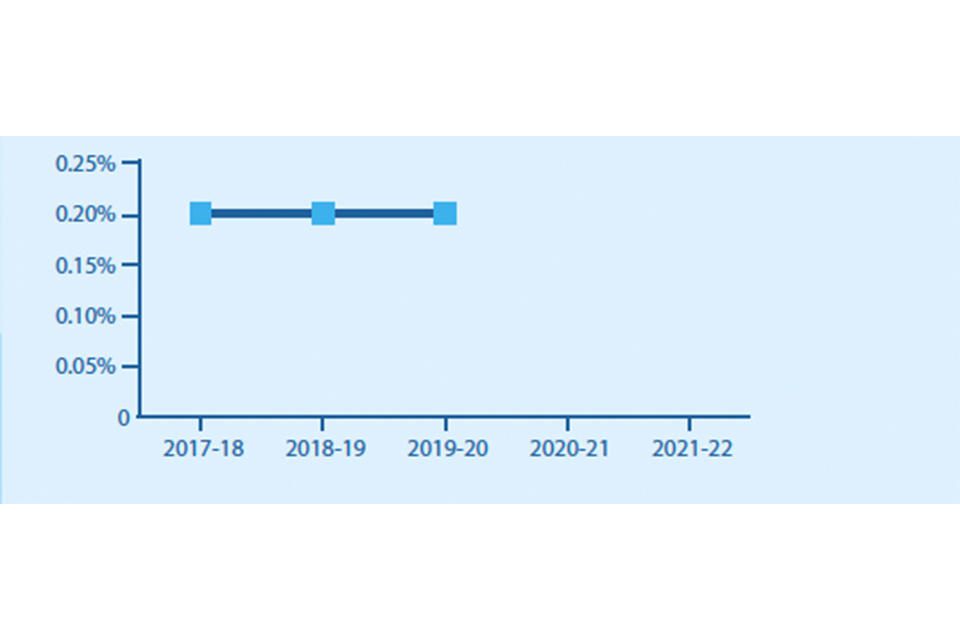
Serious further offences are rare. Consistently, fewer than 0.5% of offenders under statutory supervision are convicted of serious further offences. Figures are based on available published data that currently covers a period up until 31 March 2020.
Outcome evaluation plans
The analysis for the ‘Extremism Risk Guideline (ERG22+) – an exploratory psychometric analysis’ and ‘Healthy Identity Intervention interim outcome study’ have been completed and findings have been shared with relevant internal stakeholders. The reports are being finalised for release on Gov.uk.
The Security Investment Programme process, outcome and economic evaluation is ongoing and is on track to deliver final findings by Spring 2023.
Priority outcome 2: Reduce reoffending
Priority for 2021-22: Reduce crime by breaking the cycle of reoffending by focusing on proven interventions: a home, a job and access to treatment for substance misuse.
We know that people who leave prison with strong foundations in place to make a success of their lives are less likely to reoffend. Reflecting on the evidence on reducing reoffending, we published our Prisons Strategy White Paper in December 2021, setting out our vision for the next ten years with a two‑year focus to address the most critical areas for reducing reoffending and keeping our streets safe[footnote 18].
During 2021-22 we tested a range of new initiatives to improve the rehabilitative support individuals receive in custody in relation to their accommodation, education and employment needs. We:
- introduced prison employment leads in 10 accelerator prisons and are rolling out these roles to a further 82 prisons
- created employment hubs, the equivalent of job centres in prisons and following successful trials, have commenced rollout to 92 prisons
- introduced employment advisory boards which link prisons with industry and makes sure that offenders use their time in prison to gain the skills and links to job opportunities they need to find employment on release – these are now in place in 48 out of 92 prisons
- launched a programme to provide eligible prison leavers with appropriate ID and a basic bank account, which will remove barriers for individuals to take up employment, secure accommodation or Universal Credit on release
- created a new education, work and skills specialist role in 17 prisons to review and improve the prison education offer and expand learning beyond the classroom into workshops and digital platforms
- launched a new transitional accommodation service in July 2021 in five English probation regions, to provide prison leavers who would otherwise be homeless, with temporary accommodation for up to 84 nights – we will roll out the service across England and Wales throughout 2022-23[footnote 19]
- introduced housing specialists in 20 prisons to support prisons to be more strategic in their response to reducing homelessness, working in partnership with commissioned rehabilitation services, homelessness prevention teams, and local authorities and will increase this number to 48 over 2022-23
- set up 11 partnerships to reduce the reoffending of people leaving prison – as part of the government’s package to cut crime and protect the public, the Prison Leavers Project was awarded £20 million to develop innovative ways to help turn people leaving prison away from crime[footnote 20][footnote 21]
Following the successful testing of these initiatives, we secured £200 million a year of funding by 2024-25 to improve prison leavers’ access to accommodation, employment support and substance misuse treatment and further measures for early intervention to tackle youth offending.
In December 2021, we published the cross‑government drugs strategy setting out our ambitions for the next 10 years[footnote 22]. To deliver against this, MoJ has secured £120 million to support people in prison and probation into treatment and reduce the threat of drugs in our prisons, as part of a wider £780 million allocation for treatment and recovery. This funding will enable us to begin wider rollout of a range of initiatives which have piloted during this reporting period. These include:
- the rollout of abstinence-based drug recovery wings alongside an increase in incentivised substance-free living wings across the prison estate
- the recruitment of drug strategy leads in prisons, and health and justice co-ordinators, to strengthen links between prisons, probation, and community treatment
- the rollout of video technology, enabling prisoners to meet their new community-based treatment providers virtually before release
- an increase in testing for those on drug rehabilitation requirements in the community
- funding for a new drug testing contract, which will give us enhanced methodologies and flexibility to test for a broader range of substances
On 26 June 2021, we successfully delivered our probation reform programme by unifying our probation service, joining staff from the previous National Probation Service and 21 Community Rehabilitation Companies. By bringing together sentence management under the new unified Probation Service we can offer better supervision support for low, medium and high-risk offenders and provide the appropriate rehabilitative and resettlement support.
The COVID-19 pandemic resulted in significant challenges for probation services. To support government restrictions, the probation system introduced exceptional delivery models which allowed us to keep staff, people on probation and victims safe, while continuing to manage risk and protect the public. However, exceptional delivery models also had significant impact on core functions. While all regions across England and Wales have now exited exceptional delivery model delivery, the backlogs created by COVID‑19 restrictions continue to impact on service delivery.
As a requirement usually delivered in groups to people on probation, COVID-19 has severely impacted the delivery of Community Payback. Performance levels are now recovering and our target is to reach 155% of pre‑pandemic levels by the end of the calendar year. We are investing an additional £93 million in Community Payback over the next three years in order to boost delivery from around 5 million hours per year (pre‑pandemic baseline) up to around 8 million hours of Community Payback per year. This will allow us to effectively work down the backlogs of unmet hours caused by the pandemic.
We have increased our use of electronic monitoring with the aim of nearly doubling the number of people on tags[footnote 23]. In April 2021, we began fitting prolific robbers, thieves and burglars with GPS tags as they come out of prison, expanding the project to cover half of England and Wales in September 2021. We have seen the first convictions using location data that locates the offender to the scene of further crimes. On 31 March 2022 we reached the one-year anniversary of the alcohol abstinence monitoring requirement being introduced in England. Between April 2021 and March 2022, 3,621 alcohol monitoring requirements were imposed and since they were introduced, individuals were compliant over 97% of days monitored.
Following the success of the alcohol abstinence monitoring requirement, in November 2021 we launched alcohol monitoring tags for prison leavers whose offending is driven by alcohol. This is a world-first project and by 2025 we aim to have issued 12,000 orders[footnote 24].
We are recruiting trainee probation officers at unprecedented levels despite recruitment and retention of staff remaining challenging. We met targets to recruit 1,000 trainee probation officers in 2020-21 and 1,500 in 2021-22. We now also committed to onboarding 1,500 new trainee Probation Officers in 2022-23.
Tackling offending by youths plays a vital role in making sure they can lead their adult lives free from crime. International evidence shows that smaller, therapeutic units are more successful in rehabilitating offenders and reducing reoffending[footnote 25]. We are setting up our first secure school, which will be registered as both a 16-19 academy and a secure children’s home, due to open in late 2023.
Our performance metrics
Prison leavers in employment
- % of prisoners in work six months after their release
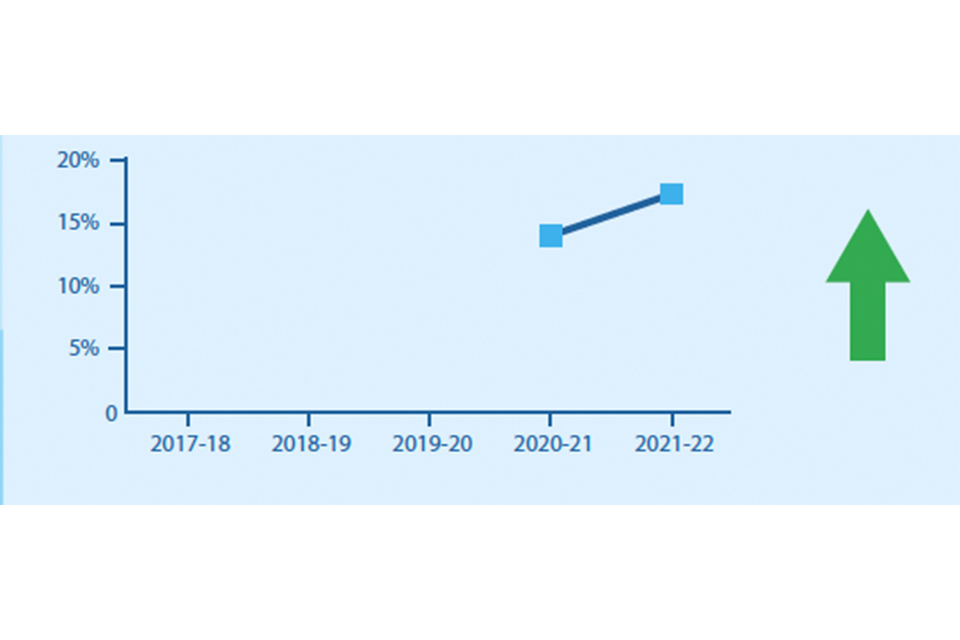
2021-22 saw employment rates for prison-leavers six months post release recover and exceed pre-pandemic performance, rising by almost two thirds between April 2021 and March 2022, to 23%. A series of events delivered by New Futures Network and the MoJ Employment Campaign team led to increased engagement from businesses about partnering with prisons and probation to offer work opportunities for serving prisoners and job outcomes for prison leavers.
Post‑custody accommodation
- % of prisoners in settled accommodation three months after release
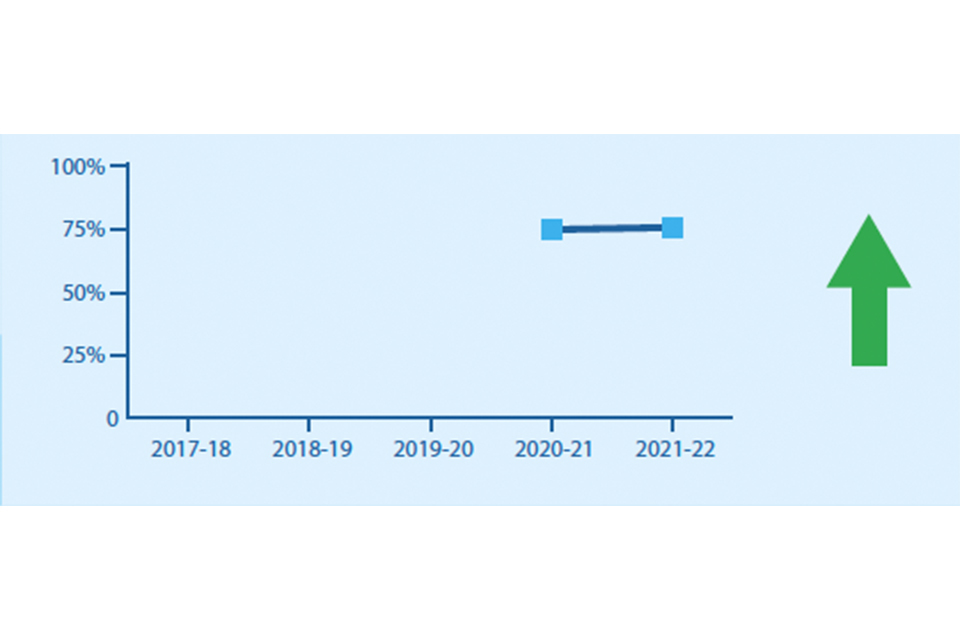
Since launching in July 2021, the new service for prison leavers at risk of homelessness (providing up to 12 weeks temporary accommodation) has housed 2,406 prison leavers as of June 2022, and many have moved into settled accommodation.
Post‑custody treatment
- % of adults with a need for treatment for substance misuse who successfully engage in community-based structured treatment within three weeks of release from prison
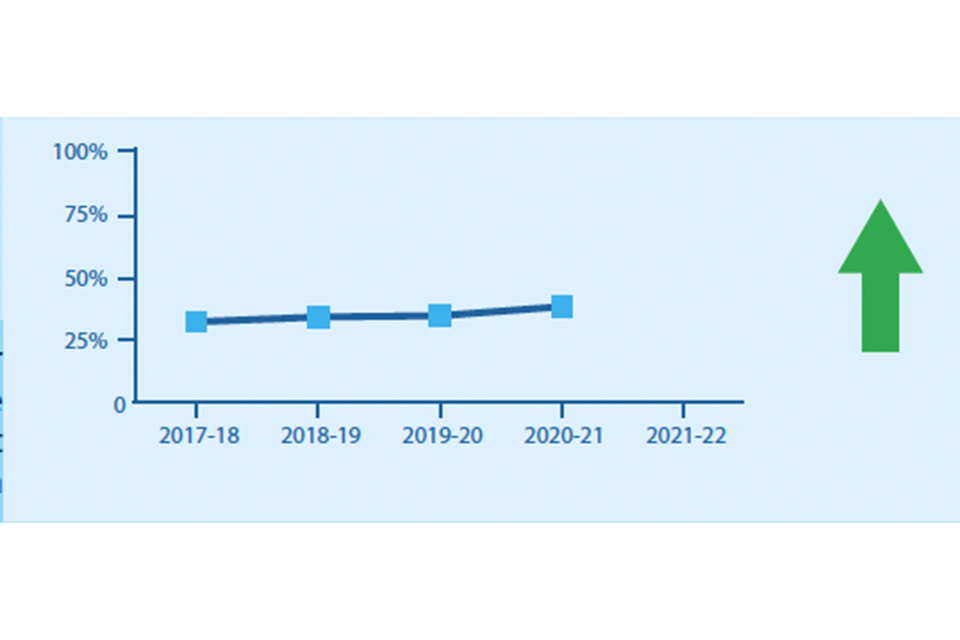
The proportion of adults released from prison and successfully starting community treatment within three weeks of release was 38.1% in 2020-21. This has increased by 3.6 percentage points from the proportion in 2019-20 (34.5%) and is 7.8 percentage points higher than when this was first reported in 2015-16 (30.3%).
Outcome evaluation plans
We have secured funding of £5 million over the next five years to evaluate our probation reforms. This is a large-scale evaluation strategy. Initially this includes process evaluations of unpaid work pilots, pre-sentence report pilots and a transition to adulthood hub model, evaluation of a blended supervision model and a victim notification scheme. Looking further ahead, we will be embarking on impact evaluations of these projects, with further plans to evaluate the impact of the integrated offender management model and the commissioned rehabilitative services model alongside the delivery of structured interventions.
In line with our Outcome Delivery Plan 2021‑22, our process evaluation of the Reducing Reoffending Delivery Programme is due for publication in Autumn2022. An impact evaluation designed to assess the impact of the programme. on employment, accommodation and reoffending outcomes is due to be carried out in 2024.
The fieldwork and analysis for the Youth Justice Reform Programme Evaluation is complete, and the final report is currently undergoing quality assurance checks before going out to academic peer review. The evaluation is expected to be published before the end of 2022.
Priority outcome 3: Deliver swift access to justice
Priority for 2021-22: We will increase the throughput of volumes of cases by maximising capacity and make the courts and tribunals system stronger and smarter and work to support victims, tackling sexual and domestic violence and making sure the vulnerable are supported in the justice system.
Our focus this year was on maximising both physical and judicial capacity for hearings, particularly for jury trials in the Crown Court to reduce risks around the high levels of caseloads in the system.
Estates improvements
With the easing of COVID-19 related social distancing our estate opened further following assessments to ensure the safety of those using our buildings.
We developed an estates strategy which guides our decision‑making, helps us maintain our buildings in the best possible condition, looks for innovative capacity and capability solutions and delivers value for money.
In July 2021, the Newcastle Civil and Family Court and Tribunals Centre opened as a modern space providing 25 courtrooms for civil, family and tribunal hearings making it easier for people to access justice. It replaced several buildings, some not fit for purpose, that previously heard this work.
In September 2021, we opened the first new ‘super courtroom’ at Manchester Crown Court, three times the size of a usual courtroom, followed by a second super courtroom at Loughborough Magistrates’ Court in November 2021. This allowed us to restart trials with up to 12 defendants, which usually involve gang related crime such as county line drug trafficking, murders and money laundering. The trials that require this level of space built up during COVID-19 due to the need for social distancing. These courtrooms, which are national resources, are giving us the capacity we need to clear these physically‑difficult types of case from the backlog, while preventing disruption to other courtrooms in the building.
In June 2021, we received £22 million for the extension of Nightingale courts through to the end of March 2022. In addition to our permanent estate, we utilised a total of 34 Nightingale court venues during 2021-22, providing 72 courtrooms, of which 46 were Crown jury trial rooms. We increased the number of available courtrooms across all jurisdictions to 2,478 (excluding Nightingale venues) as at the end of March 2022, representing an increase of over 9% over the year.
Judicial recruitment
We provided support for the increased levels of judicial sitting days, in particular in the Crown Court and the Family Court. We expanded the national fee‑paid pool of judges, providing access to a greater number of judiciary capable of deployment across England and Wales.
We have worked to address recruitment and retention issues within the judiciary. We have raised the mandatory retirement age for judges and magistrates from 70 to 75, as well as introducing a reformed pension scheme for judges. The new Judicial Pension Scheme, launched in April 2022, is unparalleled in the public sector, reflecting a significant investment in the judiciary and a commitment to ensuring that we continue to attract and retain high calibre applicants.
We have also undertaken one of our most ambitious programmes of judicial recruitment ever for up to 1,100 judges and tribunal members and we have plans for the same scale of recruitment in 2022‑23. Meanwhile, we’ve launched a major campaign to recruit 4,000 new magistrates, bringing greater diversity to the bench over the next few years.
Investing in technology
Modernised systems proved essential to the running of the justice system during COVID-19. Our ambitious, multi-year reform programme uses modern technology to speed up justice across all jurisdictions, including in the criminal courts[footnote 26].
Our Common Platform is a new digital platform to cut down manual document handling, improving the way criminal cases are accessed, managed and processed. We paused national rollout in August 2021 to resolve performance issues and allow time for planned improvements to be completed. During this time, Common Platform remained live in 101 courts (44%). In March 2022, Common Platform went live in an additional 11 criminal courts. It’s now being expanded to manage all 1.5 million annual criminal cases by the end of 2023 and has been rolled out to 50% of courts.
During the pandemic, we accelerated the rollout of video conferencing technology to support a wide range of remote hearings, hosting more than 20,000 hearings each week using remote technology across all jurisdictions. As national restrictions have eased, we expect video hearings will continue to be an integral part of a modernised justice system.
Legislation
These actions have contributed to reducing caseloads, although timeliness remains a continuing risk impacting victims and witnesses.
We remain committed to improving how victims and witnesses experience the justice system. The revised Victims’ Code came into force in April 2021[footnote 27], bringing together 12 overarching rights outlining the minimum level of information and service victims can expect at every stage of the justice process[footnote 28]. In December 2021, we also consulted on a Victims’ Law building on the Victims’ Code to substantially improve victims’ experiences of the criminal justice system[footnote 29].
The Domestic Abuse Act was enacted in April 2021 and most measures are now in force, including making it a criminal offence to threaten to share private sexual content[footnote 30].
Alongside the Domestic Abuse Act, we have launched a pilot at family courts in North Wales and Dorset to better support victims of domestic abuse to ensure that victims are fully heard and supported[footnote 31].
In June 2021 we published the End-to-End Rape Review Report on Findings and Actions and are taking forward a programme of work to address the low number of effective trials in rape and sexual offence cases[footnote 32]. The review sets out the government’s proposals to more than double the volume of adult rape cases reaching court by the end of this Parliament.
We are expanding support for victims and witnesses by increasing our funding to £185 million by 2024-25. This increase in funding will allow us to fund more than 1,000 independent sexual and domestic violence advisers and introduce new services such as crisis helplines. In March 2022, the government committed £147 million of this budget per year on a multi‑year basis to 2024-25[footnote 33].
We published the first Criminal Justice System Delivery Data Dashboard, previously named the Criminal Justice System Scorecards, to increase transparency, understanding of the justice system and to support collaboration[footnote 34].
This brings together data from partners across the system, including the police, the Crown Prosecution Service (CPS) and the courts, and presents data for all crime and adult rape offences.
In December 2021 we announced the national rollout of Section 28 pre‑recorded cross‑examination for complainants of sexual and modern slavery offences. The first phase of this rollout began on 31 March, with the rollout extending to 26 Crown Courts at the time of publication. We are working to make Section 28 available in all Crown Courts as soon as practicable.
We have made significant progress on delivering the Rape Review action plan, including the publication of the Victims Funding Strategy, the launch of a consultation on how to enhance support for rape victims and the development, alongside the Home Office, of a new investigatory model which focuses on suspects rather than victims.
Following these actions we have started to see some increases in the number of referrals of adult rape cases from the police to the CPS, and the number of charges and Crown Court receipts as a result. In the first quarter of 2022, we have seen 873 police referrals for advice, early advice or charge, 90% more than average quarterly figures in 2019. We have seen 401 CPS charges, which is 64% higher than in 2019, and 418 Crown Court receipts, which represents an 82% increase from 2019[footnote 35].
In December 2021, we published Sir Christopher Bellamy KC’s independent review into criminal legal aid provision in England and Wales. This explored what is working well and what more could be done to improve criminal legal aid for providers and the public. In March 2022, the government published its response and consultation on policy proposals[footnote 36]. The government proposes to increase criminal legal aid spending by £135 million per year. The proposals are broken down into two sections. The first focuses on fee increases which would deliver a significant uplift to almost all fee schemes. Secondly, we are seeking views from practitioners on how best to reform the fee schemes to ensure that they pay properly for work done and reflect how work is done in the modern criminal justice system.
In March 2022 the government published the Legal Aid Means Test Review, which lays out proposals to update the civil and criminal legal aid means tests[footnote 37]. These proposals, if enacted following consultation, will mean that an extra 2 million people per year in England and Wales will be eligible for civil legal aid and an extra 3.5 million will be eligible for legal aid at the magistrates’ court.
Our performance metrics
Crown Court disposals
- Number of cases disposed of in Crown Court
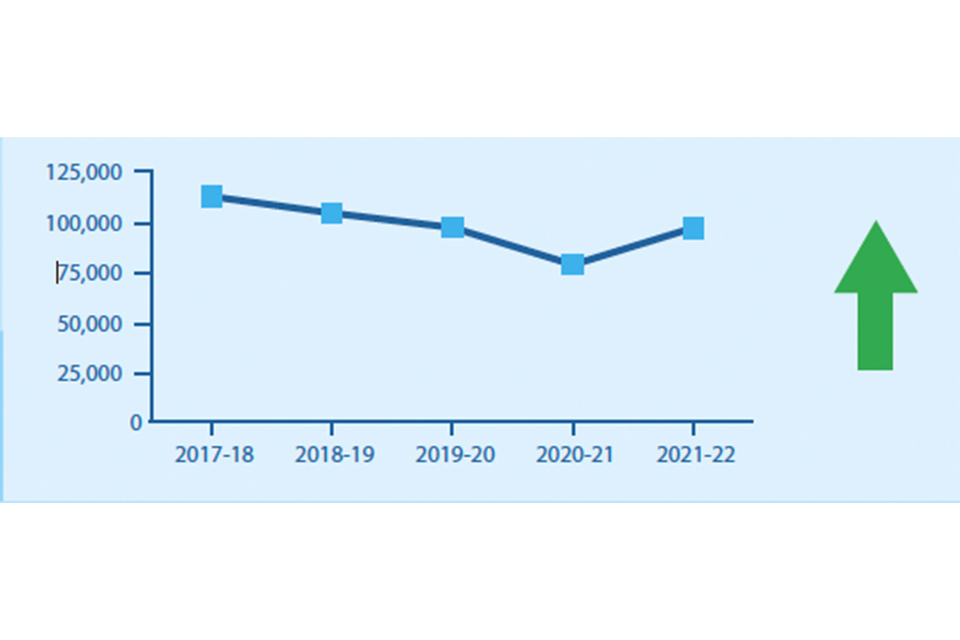
The increase in disposals up to March 2022, was helped, in part, by the lessening of restrictions nationally. This enabled more courtrooms to be opened for ‘in person’ hearings while still maintaining virtual hearings, which resulted in increased hearing levels. This was also helped by the increase in Nightingale courts and the extension of existing ones until March 2022. Restrictions on sitting days were also removed so the increasing numbers of open courtrooms could be used to capacity.
Magistrates’ courts disposals
- Number of cases disposed of in magistrates’ courts
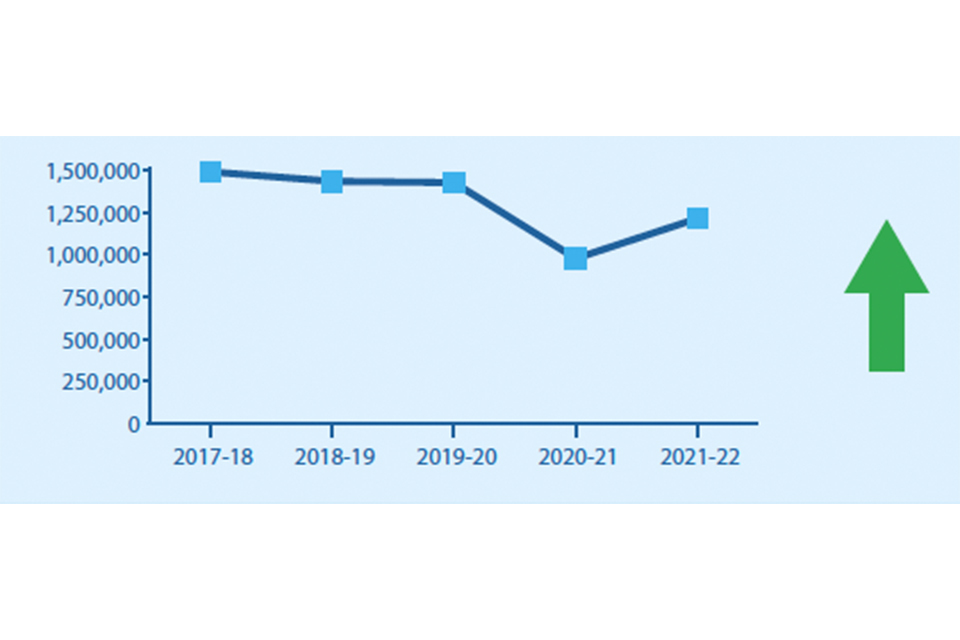
The increase in disposals reflected, in part, a change in the case mix. During periods in which social distancing restrictions were in place, many of the regulatory offences that are ordinarily brought before the magistrates’ courts were prosecuted in lower volumes. For example, rail fare evasion cases were not prosecuted when very few people were using public transport. Large volumes of these cases can be completed in a single court session. Once public transport usage increased, so too did enforcement activity, and the volume of prosecutions and disposals.
Family court disposals (private law)
- Number of cases disposed of in private law family courts
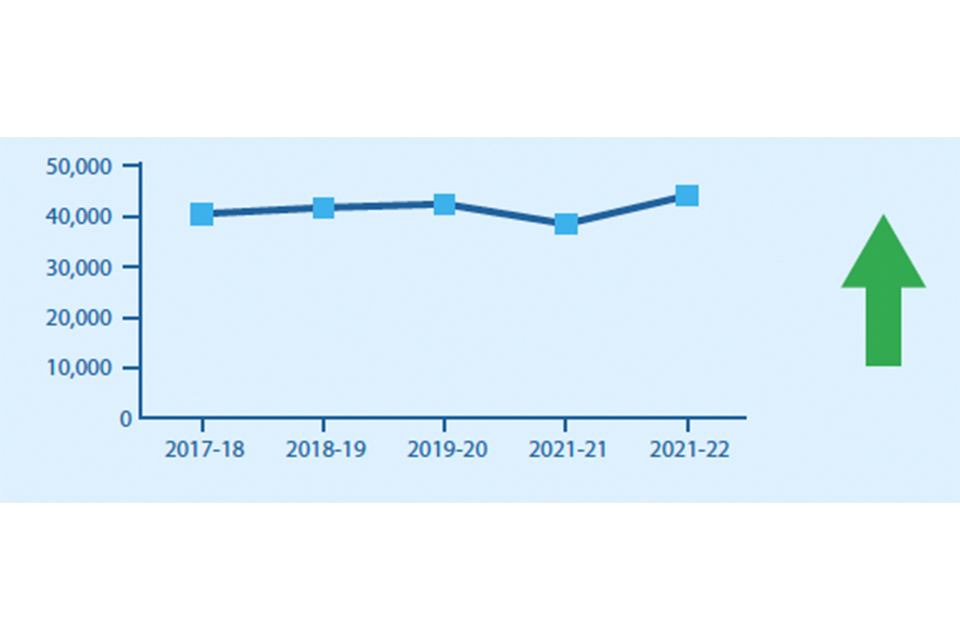
Family court disposals (public law)
- Number of children with a case disposal in the family court (public law)
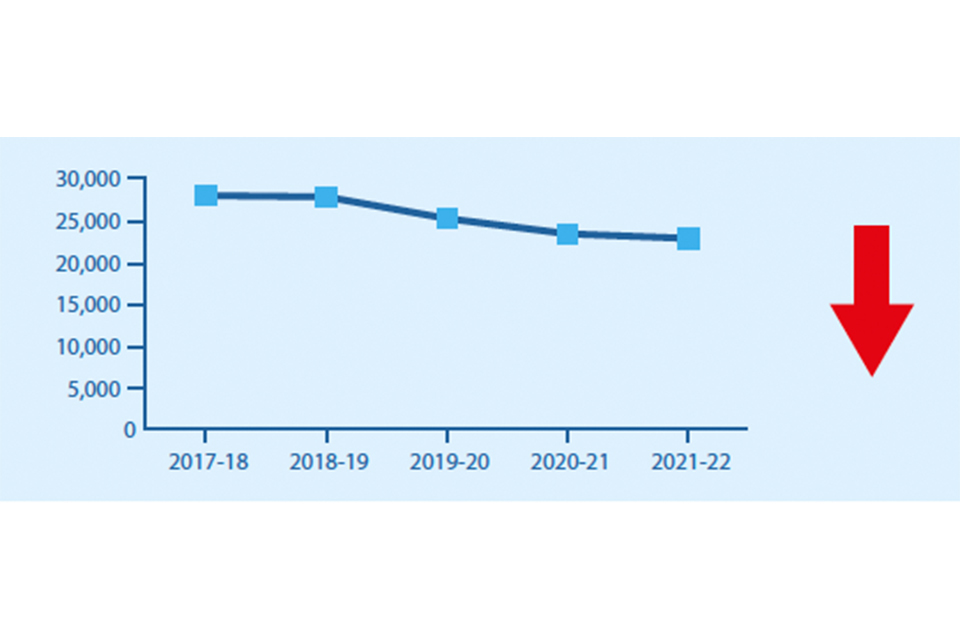
To address the outstanding caseload, we are maximising sitting days to increase disposals. With the removal of COVID‑19 restrictions, we have been able to increase our use of face-to-face hearings, although remote hearings will continue to play a part in the overall recovery effort. We continue with our ambitious programme of recruitment to build judicial capacity so that we can hear as many cases as possible.
Employment tribunal disposals (single claims)[footnote 38]
- Number of cases disposed of in employment tribunals
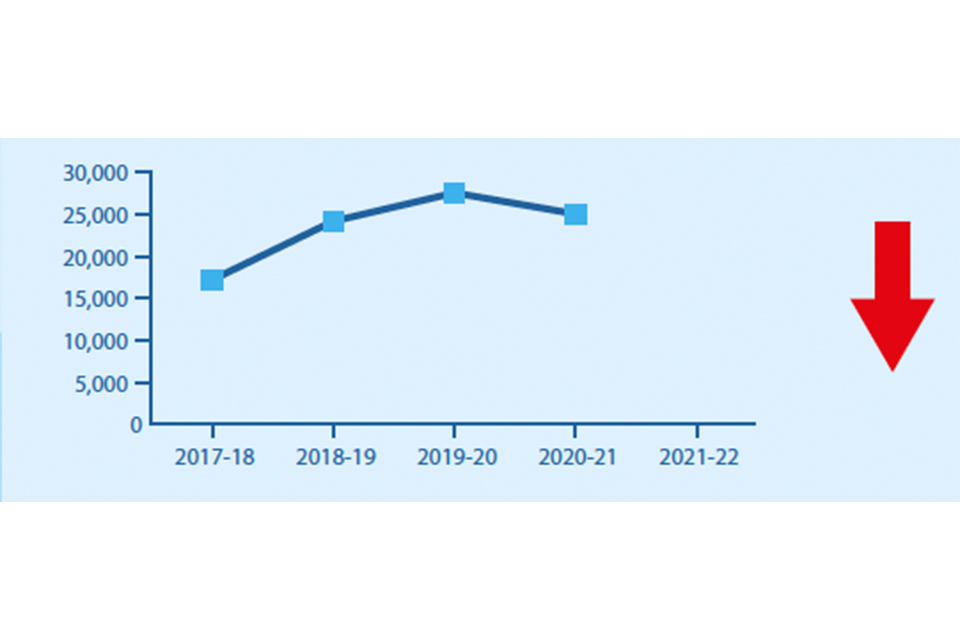
Data is not available for 2021-22 due to the impact of moving to a new system.
Victims’ Code
- Proportion of victims who had heard of the Code of Practice for Victims of Crime
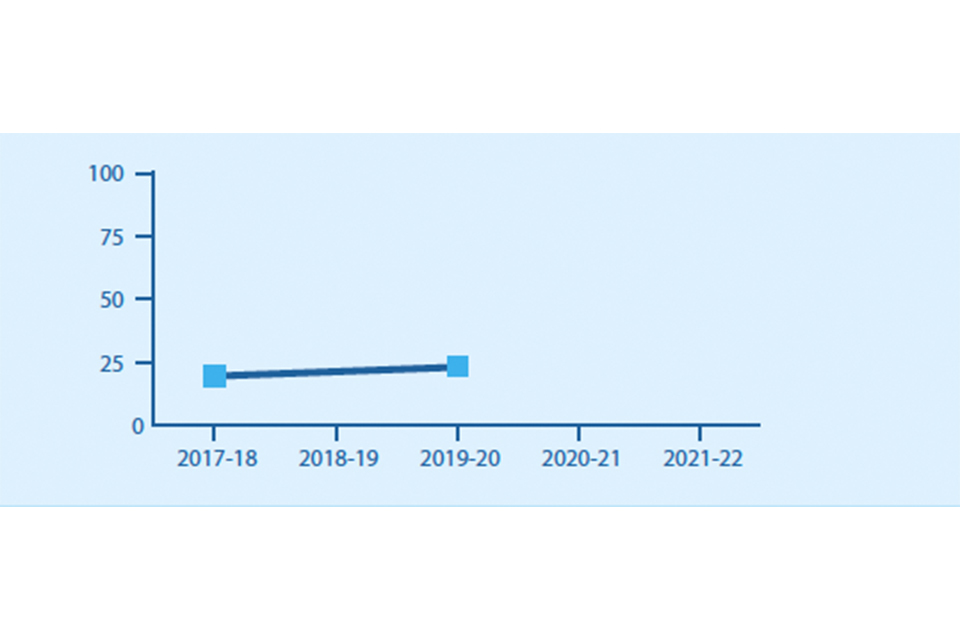
Awareness of the Victims’ Code increased between the year ending March 2018 and the year ending March 2020. This data has not been available since, as the question was removed from the Crime Survey for England and Wales during the pandemic due to shortening the survey following a change to telephone interviews. The next set of data available on this metric will be for the year ending March 2023.
Outcome evaluation plans
We are conducting an overarching evaluation, running alongside the HMCTS court reform programme. The evaluation will help assess whether the reforms are meeting their intended aims. Our plan comprises a mixed methods approach, which includes analysis of management information, primary research, reviews of existing evidence and evaluations of specific reform projects.
Different research strands are at different stages, with some evaluations underway and others in scoping stages. Findings for the different strands will be published when each strand completes. An interim report for the evaluation is due to be published in December 2022. The final overarching evaluation report will be published following the completion of all research and evaluation strands, likely to be in 2025-26.
Legal aid fee scheme uplifts will be monitored using quarterly statistical publications.
Strategic enablers
Our corporate functions provide the specialist expertise that every organisation requires for strong performance. Our people are vital to everything we do as a department and effective financial management is essential to meet the expectations of parliament and deliver accountability to the general public. Our openness to new ideas and digital change has helped us address the unique and unprecedented challenges of COVID-19 recovery and deliver better public services.
Workforce, skills and location
This year we ran ambitious recruitment campaigns within the courts, probation and prisons, including appointing over 1,500 new trainee probation officers and over 4,000 new prison officers.
During 2021-22, we saw an improvement in wellbeing of our people as lockdowns and other restrictions reduced. This was evidenced by the positive results received through the Civil Service People Survey[footnote 39].
In support of the Levelling Up agenda and Places for Growth, we committed to move around 1,200 roles out of London by 2025. This year we increased our ambition by an additional 800 roles by 2030, of which 500 are to be based in Wales. By March 2022 we achieved around 720 full time equivalent staff against our 2025 target, opened the first wave of offices in our national office network (Liverpool, Leeds, Cardiff and Stafford) and adopted a national recruitment principle for roles in scope.
Innovation, technology and data
Digital services have transformed our users’ experiences in a profound way. Since the start of COVID-19 there has been a remarkable increase in the use of technology across all our services, from remote parole and court hearings, to virtual prison visits, and a significant increase in virtual and hybrid meetings. In April 2022 we published our strategy setting out how we will realise our vision of simpler, faster and better services[footnote 40].
To help support victims of crime we simplified the Criminal Injury Compensation Service, making claiming on behalf of minors easier, with user satisfaction high at 92%. We’re continuing to develop the service to ensure it benefits all users.
We also launched a consultation on modernising lasting power of attorney, bringing us closer to a fully digital LPA service.[footnote 41]
We are developing and testing the Legal Aid ‘Apply’ service which has received positive feedback from providers who are using it. When it is fully rolled out, it will remove reliance on one of our biggest and most complex legacy systems. We continue to bring our top 40 IT systems into full health against a set of critical criteria that reduces the risks of exposures, vulnerabilities and non-compliance.
Data is becoming an increasingly important part of our operation and decision-making to inform the efficient delivery of our outcomes. MoJ is central to a complex justice system, which requires the ability to analyse, model, and make evidence-based decisions while retaining stakeholder confidence. We are embedding a new target operating model in 2022-23, developing a data strategy, and will continue to automate systems and data pipelines, modernise analytical models and move away from outdated software.
A good example of this is MoJ’s Data First programme, which developed an award-winning open-source data linkage software called Splink, providing a radical improvement over existing techniques for linking data at scale. It links datasets which are a hundred times larger and a hundred times faster than comparable software, and it works with most government digital platforms.
In partnership with the Welsh Government, the Department for Health and Social Care, the Department for Levelling Up, Housing and Communities and Public Health Wales, we have set up a cross-government programme called Better Outcomes through Linked Data - BOLD[footnote 42]. The programme will demonstrate how people with complex needs can be better supported by linking and improving the government data held on them in a safe and secure way. It operates using the Splink software to link enormous datasets on secure platforms across departments, breaking down barriers to sharing data and helping to drive changes in our services and improve outcomes. Through BOLD, we are pioneering data-linking to help us to reduce reoffending, homelessness, substance misuse, and support victims of crime, to transform how we support those in society with the most complex needs.
Delivery, evaluation and collaboration
We are embedding an inclusive culture which encourages excellence and collaboration, so we manage delivery with rigour and efficiency, supported by effective and insightful evaluation:
- In October 2021, we held an offender employment summit, which successfully engaged employers nationally to support the recruitment of ex-offenders[footnote 43]. During 2021, over 700 businesses registered for the scheme supporting employers across Britain in filling critical vacancies during COVID-19, while supporting ex-offenders in their resettlement process.
- Led by the MoJ, in November 2021 GREAT Legal Services led a legal services sector trade mission to the United Arab Emirates to promote the UK legal sector[footnote 44]. This trade mission was the first of its kind and our largest overseas activity since COVID-19 began, with 100% of delegates surveyed agreeing the mission increased positive perceptions of the UK legal sector in the UAE.
- The quality and continuing maintenance of our property estate is critical to the delivery of our justice services. Throughout COVID-19, we have ensured that our estate remained fit for use and compliant with government health guidelines. Our frontline estate continues to be predominantly aged and will require significant ongoing investment to maintain the necessary capacity levels to deliver safely and effectively.
Sustainability
We have a responsibility to reduce our negative effect on the environment and increase biodiversity. Our new prisons programme is currently exceeding 10% biodiversity net gain, and we have drafted our first nature recovery plan for the estate[footnote 45].
Our agencies and functions have developed sustainability action plans, which will be refreshed during 2022-23 alongside the production of Greening Government Commitment and net zero carbon delivery plans to improve performance against the 2025 targets[footnote 46].
Our performance metrics
People survey engagement score[footnote 47][footnote 48]
- Average engagement score (%)
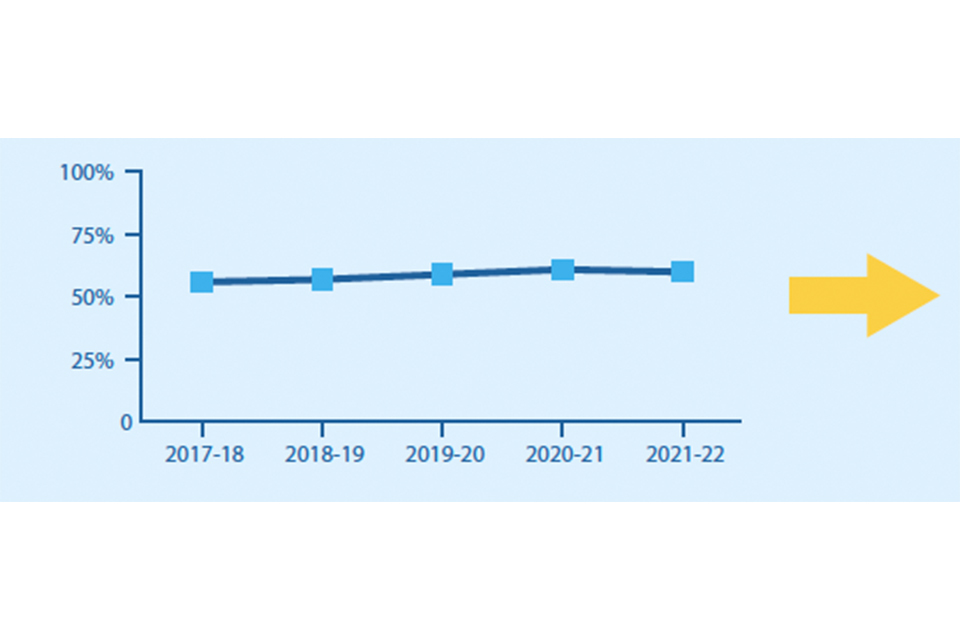
Representation of female staff49,49
- % of staff who are female
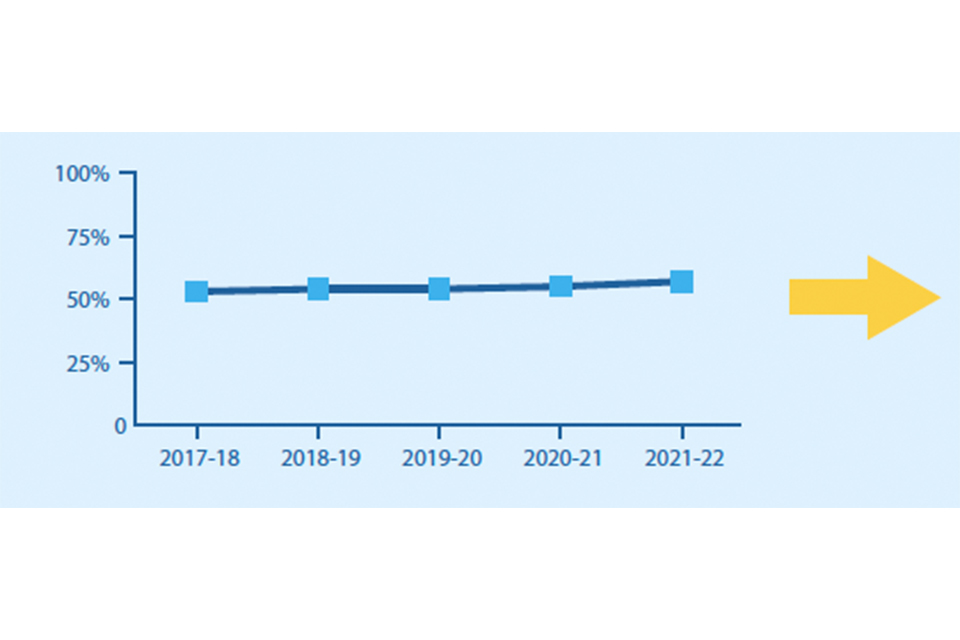
Representation of ethnic minority staff[footnote 49]
- % of staff who are Black, Asian and minority ethnic
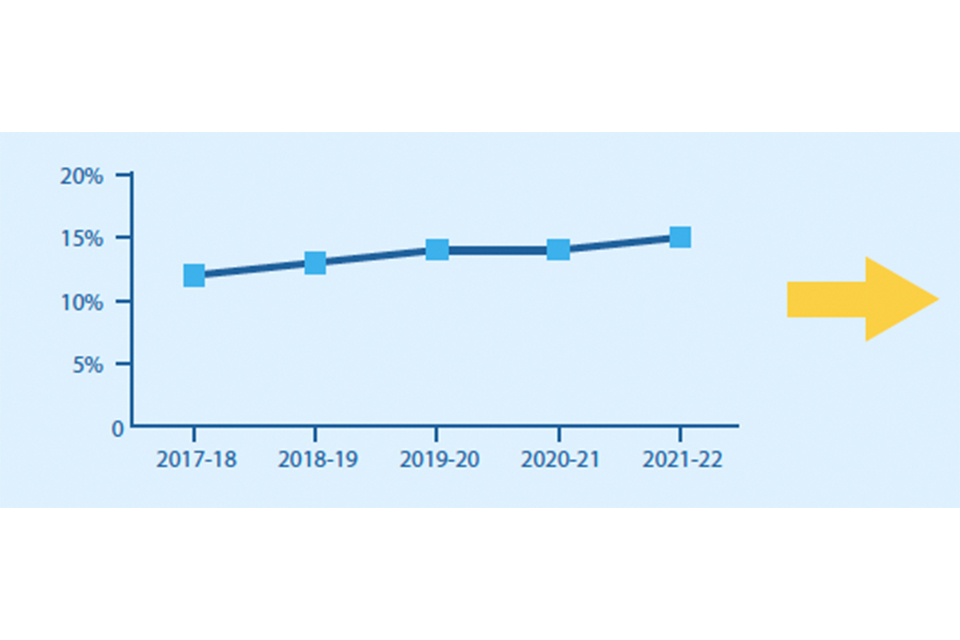
Representation of disabled staff[49]
- % of staff who are declared disabled
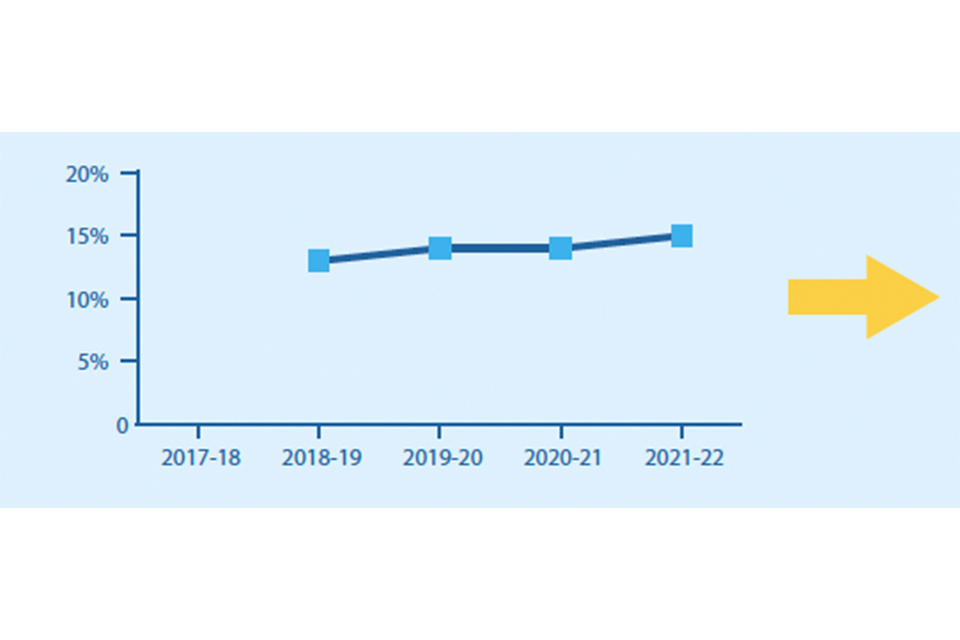
Greenhouse gas emissions Annual CO2 emissions
- (% vs baseline year)
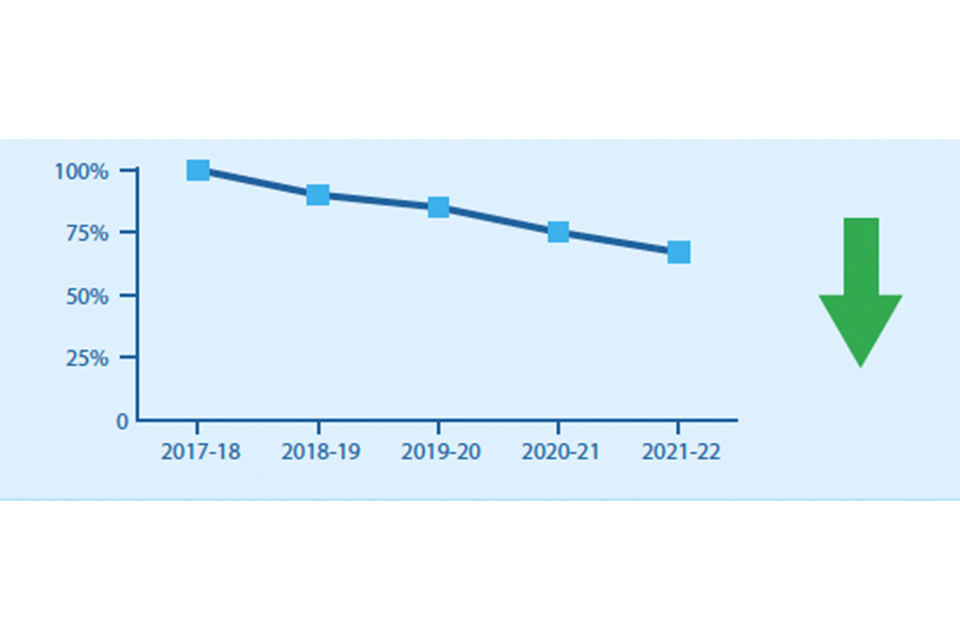
Currently our emissions have reduced by 33% compared to our baseline year against a target of 41% by 2025. This has been achieved through a combination of grid decarbonisation and energy efficiency measures taken across our estate.
United Nations Sustainable Development Goals
MoJ shares responsibility with other government departments for supporting delivery of the UK’s commitments to the UN Sustainable Development Goals (SDG). Below describes MoJ’s contributions.
SDG 3 – Good health and wellbeing (Target 3.5)
MoJ’s priority outcomes (contributing to SDG):
Reduce reoffending - Substance misuse
MoJ activity in 2021-22:
In December 2021, the 10-year Drugs Strategy was published which sets out how this government will address illegal drug use[footnote 51].
SDG 4 – Quality education (Targets 4.4, 4.6, 4a)
MoJ’s priority outcomes (contributing to SDG):
Reduce reoffending - Education
MoJ activity in 2021-22:
In December 2021, we published our Prisons Strategy White Paper which sets out the pathway for a new Prisoner Education Service[footnote 52]. This will make sure offenders can improve their basic literacy and numeracy, as well as acquire further vocational qualifications.
SDG 5 – Gender equality (Targets 5.1, 5.2, 5c)
MoJ’s priority outcomes (contributing to SDG):
Reduce reoffending - Tackling female reoffending
Deliver swift access to justice - Domestic abuse
MoJ activity in 2021-22:
We have secured a site for the first Residential Women’s Centre in South Wales, which will work to address reasons for low-level female offending, such as domestic abuse and sexual assault.
We have also made £2.5 million available to meet the core costs of women’s community services to help provide essential services to vulnerable women and those with complex needs in the justice system.
On 29 April 2021, the Domestic Abuse Act came into law[footnote 53]. The act aims to ensure that victims have the confidence to come forward and report their experiences, safe in the knowledge that the state will do everything it can, both to support them and their children and pursue the abuser.
SDG 8 – Decent work and economic growth (Targets 8.3, 8.5, 8.6, 8.8)
MoJ’s priority outcomes (contributing to SDG):
Reduce reoffending - Employment opportunities
and access to work - Resettlement support
Protect the public from serious offenders and improve the safety and security of our prisons
MoJ activity in 2021-22:
The Prisons Strategy White Paper sets out how we will tailor our approach to meet diverse needs[footnote 54].
We have introduced new resettlement passports, bringing together all of the essentials that prison leavers need to lead crime-free lives on release into one place, such as ID that demonstrates a prisoner’s right to work and a bank account.
We have put a dedicated employment adviser in every resettlement prison and have developed a digital candidate matching system to match prisoners to roles on release.
Employment hubs have been established where prisoners can get support and find opportunities.
We have established employment boards, which link prisons with local business networks to provide advice and challenge so that prisons provide the skills that employers need.
We have also developed a programme to improve rehabilitation and engage prisoners in supporting maintenance tasks within the prison environment.
SDG 10 – Reduced inequalities (Target 10.2)
MoJ’s priority outcomes (contributing to SDG):
Reduce reoffending
MoJ activity in 2021-22:
In January 2022 we published our annual Gender Pay Gap report setting out actions for 2022-23 in three areas: talent and inclusion, flexible and family friendly, capability and advocacy[footnote 55]. We’ve taken significant steps to address racial disparity in the criminal justice system and in March 2022 we published our ambitious response to the Commission on Race and Ethnic Disparities Report[footnote 56].
SDG 12 – Responsible consumption and production (Targets 12.6, 12.8)
MoJ’s priority outcomes (contributing to SDG):
Protect the public from serious offenders and improve the safety and security of our prisons - Building sustainable prisons
MoJ activity in 2021-22:
We have reduced our total emissions by 33% since 2017-18 against a target of 27% for 2021-22. The four new prisons have been designed to deliver around a 90% reduction in carbon emissions compared to Glen Parva. We are also working on an approach on how we will use technology and digital services to help implement the 25-year environment plan.
SDG 13 – Climate action (Target 13.2)
MoJ’s priority outcomes (contributing to SDG):
Protect the public from serious offenders and improve the safety and security of our prisons
MoJ activity in 2021-22:
We have undertaken a climate change risk assessment of our estate and operations to inform our emerging climate change adaptation plan. We also introduced climate change screening for programmes and major projects.
SDG 16 – Peace, justice and strong institutions (Targets 16a, 16.1, 16.4, 16.6, 16.7)
MoJ’s priority outcomes (contributing to SDG):
Reduce reoffending Protect the public from serious offenders and improve the safety and security of our prisons - Security Investment Programme
Deliver swift access to justice - Judicial recruitment
MoJ activity in 2021-22:
The Prisons Strategy White Paper was published in December 2021, setting out the investment in our prisons to make them safer, including making changes to the physical environment, introducing specialist support and developing bespoke interventions.
We are improving how we identify and manage those who pose a raised risk of being violent through a national case management model. This will focus on identifying and addressing the underlying causes of a prisoner’s violent behaviour, to reduce further risk of violence.
Our security investment programme has introduced technology which helps to prevent illicit items from entering prisons.
We have increased representation from underrepresented groups in the judiciary including the proportion of female and black, Asian and minority ethnic judges.
Over £1 million has also been invested in the recruitment of new and diverse magistrates, supported by a campaign to raise the profile of the magistracy among under-represented groups.
The Judicial Review and Courts Act received Royal Assent, providing new powers to judges to better tailor the outcomes of judicial reviews
Climate change and sustainability
As the second largest government estate, we have a responsibility to reduce negative environmental impacts and to enhance the natural environment. MoJ’s vision is to embed sustainability principles into everything that we do.
Governance and assurance of climate change and sustainability activity across the MoJ is co-ordinated by MoJ’s climate change and sustainability unit and performance is overseen by MoJ’s senior sustainability board. This year, MoJ has appointed a lead minister for climate change and sustainability matters, as well as an Executive Committee champion and a lead non-executive director.
Sustainability is one of four enablers in our Outcome Delivery Plan, supporting MoJ’s strategic outcomes. Particular areas of climate change and sustainability focus for MoJ in 2021‑22 included net zero carbon, Greening Government Commitments, biodiversity and embedding sustainability across the organisation.
Scope and data quality
This report is prepared in accordance with HM Treasury’s Sustainability Reporting Guidance 2021‑22[footnote 57]. The department reports on all its executive agencies and non-departmental public bodies, subject to any exemptions in accordance with the reporting guidance. The department is unable to report data from locations where property owners are not obliged to provide it. Some data will be estimated.
The data below shows our present position for 2021‑22 against a 2017-18 baseline, using data available up to March 2022. The non-financial indicators for 2020-21 have been restated to show the full financial year up to March 2021. Our sustainability performance data is audited by DNV-GL on behalf of DEFRA.
UN Sustainable Development Goals
The work of the department primarily supports delivery of four UN SDGs, our Single Department Plan, and Outcome Delivery Plan. These are SDGs 5, 10, 13 and 16, relating to climate change, equality, peaceful and inclusive societies, and access to justice. See page 41.
Greening Government Commitments
New Greening Government targets for the period 2021 to 2025 were announced during this financial year, with progress measured against a 2017‑18 baseline. MoJ is tracking its progress on a quarterly basis against annualised targets. During 2021-22 we developed Greening Government Commitment delivery plans, focusing on monitoring, and improving performance against our 2025 Greening Government targets. These will continue to be developed and updated as we initiate and deliver initiatives that contribute towards achieving these targets.
The impact of the pandemic on sustainability performance has been mixed. The majority of MoJ’s estate, including courts and prisons, has remained operational with limited impact on energy and water use. However, travel and paper use have reduced as many office-based staff were required to work from home. We will be looking to take forward many of the efficiencies and innovations that have emerged during the national restrictions, to reduce costs and improve our environmental performance. The impact on home emissions as a result of the pandemic are outside the scope of the metrics and therefore not included.
Overall Greening Government Commitments performance 2021‑22 (against a 2017‑18 baseline)
| Requirement by 2025 | 2021‑22 performance | RAG status | Commentary |
|---|---|---|---|
| Reduce greenhouse gas (GHG) emissions by 41% | -33% | yellow | While currently on track, projected performance is amber due to prison estate expansion. We have developed a net zero strategy to maintain current performance. |
| Reduce direct greenhouse gas emissions by 23% | -6% | red | Technology and financial constraints have slowed progress. We have secured external funding for decarbonisation design work at some pilot projects and are actively pursuing further external funding sources. |
| Reduce domestic business flights by 30% | -93% | green | |
| Reduce overall waste by 15% | -9% | red | Resources have been diverted to COVID-19 management. We are developing new approaches to improve resourcing and waste management, as well as associated data. |
| Landfill waste to be less than 5% | 8% | yellow | Closure of prison waste management units during the pandemic has increased landfill rates. |
| Increase recycling to at least 70% | 52% | red | Closure of prison waste management units during the pandemic has reduced recycling rates. |
| Reduce paper use by 50% | -30% | red | Progress has been slow as many processes are still paper based. MoJ is increasingly switching to digital systems which will help reduce paper use. |
| Reduce water consumption by at least 8% | -4% | yellow | Reducing water use in ageing infrastructure is difficult, particularly in prisons which run 24/7. Smart meters are being fitted to help find and fix water leaks. |
Greenhouse gases (GHG)
The table below shows our greenhouse gas emissions and financial costs for 2021‑22.
| Greenhouse gas (GHG) emissions from buildings and travel | 2021-22 | 2020‑21[footnote 58] | 2019‑20 | 2018‑19 | 2017‑18 Baseline | |
|---|---|---|---|---|---|---|
| Non‑financial indicators (tCO2e) | Total gross scope 1 (Direct) GHG emissions | 164,306 | 170,888 | 182,242 | 185,407 | 182,544 |
| Total gross scope 2 (Energy indirect) emissions | 75,251 | 92,097 | 111,393 | 126,714 | 159,865 | |
| Total gross scope 3 (Official business travel) emissions | 8,577 | 11,491 | 21,496 | 22,938 | 27,939 | |
| Total emissions[footnote 59] | 248,134 | 274,476 | 315,132 | 335,059 | 370,349 | |
| Non‑financial indicators (MWh) | Electricity | 331,944 | 319,030 | 352,133 | 361,258 | 367,773 |
| Electricity: renewable | 43,591 | 76,014 | 83,679 | 86,384 | 86,459 | |
| Gas | 860,580 | 816,750 | 837,642 | 876,973 | 886,736 | |
| Other energy sources | 47,673 | 42,689 | 47,143 | 43,114 | 37,832 | |
| Total energy | 1,283,788 | 1,254,483 | 1,320,597 | 1,367,729 | 1,378,801 | |
| Financial indicators (£m) | Expenditure on energy | 103 | 97 | 111 | 92 | 92 |
| Carbon reduction scheme | 0 | 0 | 6 | 6 | 7 | |
| Expenditure on official business travel | 10 | 5 | 29 | 28 | 24 | |
| Total expenditure on energy and business travel | 113 | 102 | 146 | 126 | 123 |
The department has reduced its greenhouse gas emissions by 33% since 2017-18 and has introduced a range of energy and carbon saving measures including:
- procurement of 203 boiler control units that will be deployed across the HMPPS estate in 2022‑23
- starting the full replacement of the building management system at HMP Elmley
- completed three ground mounted solar farms, generating approximately 450MWh of electricity and saving a forecast 1,220 tonnes of CO2 over their lifespan
- installed 395 electric vehicle charging points, across offices, prisons, and courts
- replaced over 10,000 fluorescent lamps with LEDs, saving an estimated 1.33GWh of electricity and 290 tonnes of CO2 emissions
MoJ is updating its net zero strategy, and associated delivery plan, setting short, medium, and long-term objectives for the MoJ estate and operations. We have undertaken a review across the MoJ estate to identify opportunities for further carbon savings, prioritising decarbonisation of heating and travel.
LED lights case study
HMP Garth initiated a project involving prisoners assembling low energy LED lights, thereby developing valuable skills as part of their rehabilitation, reducing prison energy use and saving taxpayers’ money. The pioneering project has since been introduced at HMP Full Sutton and HMP Guys Marsh.
The new LED lights cost 36% less than the book price of the original fittings, use 62% less electricity and are expected to save approximately £2.5 million each year once they have been installed in cells across the prison estate. The project contributes to the sustainable objectives of MoJ’s Outcome Delivery Plan and the wider Greening Government Commitments.
Climate change adaptation
As part of the implementation of the MoJ’s Climate Change Adaptation Strategy 2020, a climate change risk assessment of our estate and operations was conducted this year. The output of the assessment will be used to update our climate change adaptation plan in 2022. The risk assessment will start to identify which buildings and operations are most at risk and their capacity to adapt to the effects of climate change.
Travel
Travel has continued to be low throughout 2021‑22 due to the pandemic restrictions and the emissions from domestic flights have reduced by 90%, compared to our 2017-18 baseline. We will look at how we can take forward new ways of working developed during the pandemic to maintain lower levels of air travel.
| Air travel | 2021-22 | 2020‑21[footnote 60] | 2019‑20 | 2018‑19 | 2017‑18 |
|---|---|---|---|---|---|
| Domestic flights (km) | 204,390 | 64,326 | 1,499,117 | 1,838,087 | 1,970,637 |
| Domestic flights emissions (tCO2e) | 26 | 8 | 202 | 290 | 279 |
| International business flights (km) | 3,746,130 | 3,382,713 | 4,739,114 | 3,609,624 | 1,592,857 |
| International business flights (tCO2e) | 381 | 311 | 463 | 375 | 192 |
Water
The department has reduced water consumption by 4% compared to the 2017-18 baseline. Improvements in monitoring and measurement of water consumption have been, and will continue to be made, by installing automatic meter reading devices on water meters across the department’s estate. Using data from these meters, we have been able to identify water leaks (existing and new occurrences) at several sites, and several repairs have been completed.
| Water | 2021-22 | 2020‑21 | 2019‑20 | 2018‑19 | 2017‑18 | |
|---|---|---|---|---|---|---|
| Non‑financial indicators | Total water consumption (m3 000) | 8,709 | 9,137 | 8,940 | 8,917 | 9,072 |
| Financial indicators | Total water supply costs (£’000,000) | 23 | 24 | 29 | 27 | 26 |
Water leak repair – HMP Wetherby
Using data from smart water meters, an unusually high night-time flow rate was identified at HMP Wetherby. Two leaks were subsequently found and repaired. This reduced the night water flow rate from 17m3/hour to 3m3/hour. This represents an annual water saving of around 113,000 m3 and an annual financial saving of £340,000.
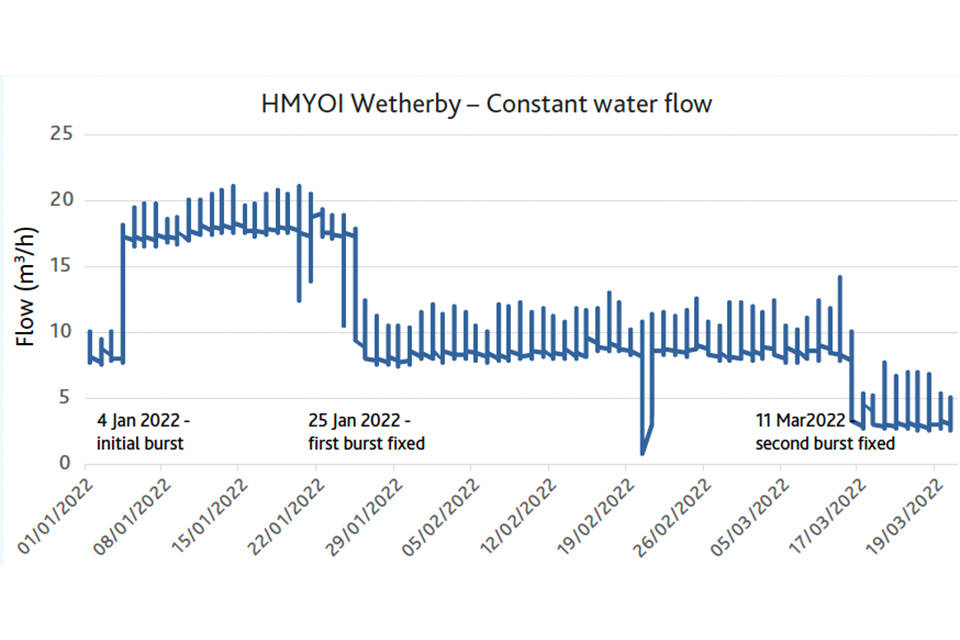
Waste and resources
Waste production 2021-22
| Waste | 2021-22 | 2020‑21[footnote 61] | 2019‑20 | 2018‑19 | 2017‑18 | |
|---|---|---|---|---|---|---|
| Non‑financial indicators (tonnes) | Landfill | 3,557 | 4,922 | 1,355 | 1,323 | 3,987 |
| Recycled/reused | 23,123 | 33,169 | 42,113 | 41,666 | 31,413 | |
| Incinerated with energy from waste | 17,516 | 6,989 | 9,102 | 6,862 | 13,454 | |
| Incinerated without energy recovery | 271 | 14 | 11 | 0 | 11 | |
| Total waste | 44,467 | 45,094 | 52,581 | 49,851 | 48,865 |
Overall waste has decreased by 9% compared to the 2017-18 baseline, with 8% of waste sent to landfill and recycling rates at 52%. Waste has been impacted by the COVID-19 pandemic due to fewer staff in offices, a smaller number of prisoners involved in segregating waste, and an increase in PPE and single-use items associated with COVID-19 precautionary measures and government requirements. We are working with our facilities management and waste contractors to improve waste management including undertaking trial schemes during 2022-23 and adopting a new circular approach to resource management.
Recycling – HMP Thorn Cross
The purchase of a mill size baler and a waste compactor at HMP Thorn Cross enabled increased recycling and a corresponding reduction in landfill waste, bringing operational costs down and reducing our carbon footprint.
The waste management unit now recycles nearly 80% of recoverable waste including cardboard, plastic, and broken furniture. The majority of food waste is also separated.
While some recycled materials are valuable and can be sold to recycling plants, other items like non-prison clothing are donated to a local charity, and prison-issued plastic cups, plates and cutlery are granulated and made into new items.
Paper usage
The department has reduced paper use by 30% compared to the 2017-18 baseline. This has been achieved through greater use of digital solutions including replacing some paper based services with online services.
Single-use plastics
Our single-use plastics policy, published in January 2019, continues to drive our work with facilities management providers to ensure single-use plastics are only used when no viable alternative is available[footnote 62]. We are also, where possible, reducing single-use plastics on the operational estate.
Biodiversity and rural proofing
A biodiversity baseline has been established as well as a nature recovery plan for the MoJ estate. This plan seeks to substantially improve the value of the estate in terms of biodiversity, wellbeing, and other ecosystem services such as carbon sequestration and flood alleviation. Over 1,400 fruit trees have been planted to create new orchards, as well as almost 9,000 deciduous trees as part of woodland planting, and 3.5km of new hedgerows. Seven tree nurseries have been established in 2021-22, which will germinate 100,000 trees per year for planting across MoJ from 2023. We have also developed a natural capital assessment tool for the MoJ estate.
Nature recovery – HMP Bristol
In 2021 HMP Bristol was the first prison in the UK to pilot the principles of the harmony project – an initiative supported by His Majesty King Charles III (while HRH Prince of Wales) to help people develop a deeper understanding of, and connection to, the beauty and wonder of the natural world.
Activities involving prisoners included renovating prison gardens and surrounding natural spaces to help encourage local wildlife, developing opportunities to connect with animals through building bird boxes and learning bee-keeping skills. Nature therapy courses have also been introduced to promote better mental health connection to the natural world.
Sustainable procurement
MoJ’s sustainable procurement policy ensures we incorporate sustainability into all procurement activities to achieve long-term value for money. Associated programmes include embedding specific sustainability clauses into all future estate contracts, a whole-life costs policy and ensuring procurement staff receive appropriate sustainability training.
We have developed a sustainability action plan covering various actions including agreeing fundamental sustainability metrics to be captured in our commercial contracts and to be monitored through the life of the contract. We have also included sustainability clauses in the MoJ model terms and conditions for goods and services requiring compliance with government buying standards and maintaining an environmental management system.
The Social Value Model forms part of our overall sustainable procurement approach. One of the themes focuses on fighting climate change which has resulted in commitments from one community accommodation service contract to deliver 100% renewable electricity, commitment to achieving Green Dragon environmental standards and a commitment to deliver properties with an Energy Performance Certificate rating above the minimum legal requirement.
MoJ achieved the target of 25% of cars converted to Ultra Low Emission Vehicles in line with the Greening Government target. This was achieved 12 months ahead of the targeted date of December 2022. The MoJ fleet currently comprises 35.1% ultra low emission vehicles and 1.1% zero emission vehicles. MoJ has planned the transition for all inscope N1 fleet vehicles under 3.5 tonnes to be zero emissions by December 2027 and continues to explore funding options.
MoJ’s prison food contract ensures all goods are bought in line with animal welfare and fair trade or ethical standards. All animal derived foods are from farm assured sources, all fish and products containing palm oil are sustainably sourced, and over 50% of produce is from the UK.
Reducing environmental impacts from ICT and digital
MoJ’s digital and technology services are also focused on delivering more environmental outcomes. In 2021‑22, we set up a digital sustainability working group looking to address the impacts of ICT on the environment, and we have adopted the Greening Government: ICT and Digital Services Strategy and associated targets.
Sustainable construction
The MoJ’s revised sustainable construction and BREEAM Policy (August 2021) requires all new build projects to target BREEAM Outstanding and major refurbishments to target BREEAM Excellent. The newest prisons, HMP Five Wells and HMP Fosse Way (previously referred to as Glen Parva), use green technologies and modern methods of construction to reduce their environmental impact and have received BREEAM 2014 New Construction Excellent certification at design stage.
Based on data provided by the Building Research Establishment, there are 29 MoJ projects currently registered under the BREEAM 2018 scheme, with 28 in progress for design and construction certification with one in progress for post construction assessment.
Antonia Romeo
Principal Accounting Officer
12 December 2022
-
As at 31 March 2022. ↩
-
As at 31 December 2021. ↩
-
From March 2021 to March 2022. ↩
-
As at 31 March 2022. ↩
-
In 2020-21, MoJ received an additional £5.5 million to set up the Independent Monitoring Authority (IMA), which monitors the application and implementation of the provisions relating to the rights of EU citizens living in the UK. ↩
-
Longer jail terms and stricter monitoring as new terror laws gain Royal Assent ↩
-
Prison Security Investment Programme: X-ray Body Scanner Management Information ↩
-
COVID-19: National Framework for Prison Regimes and Services ↩
-
Five regions: Greater Manchester; the North West; Yorkshire and the Humber; East of England; and Kent, Surrey and Sussex ↩
-
£70 million to keep prison leavers off the streets and cut crime ↩
-
Prison Leavers Project: innovating to tackle the complex causes of reoffending ↩
-
From harm to hope: A 10-year drugs plan to cut crime and save lives ↩
-
Tens of thousands more criminals to be tagged to cut crime and protect victims ↩
-
Police, Crime, Sentencing and Courts Act 2022: secure schools factsheet ↩
-
Pioneering approach in family courts to support domestic abuse victims better ↩
-
Major funding boost for victim services as local criminal justice score cards published ↩
-
It has not been possible to present data for the full financial year of 2021-22, as Employment Tribunals transitioned to a new database during March to May 2021. During the migration period full results were not available on a consistent basis. ↩
-
See ‘Our staff’ section on page 102. ↩
-
From harm to hope: A 10-year drugs plan to cut crime and save lives ↩
-
Government response to the Commission on Race and Ethnic Disparities ↩
-
2020-21 non-financial indicators have been restated to include actual environmental performance for the financial year. ↩
-
2020-21 non-financial indicators have been restated to include actual environmental performance for the financial year. The number of restated domestic flights shows a significant drop, due to the previous figures including a pre‑pandemic quarter. ↩
-
2020-21 non-financial indicators have been restated to include actual environmental performance for the financial year. ↩
